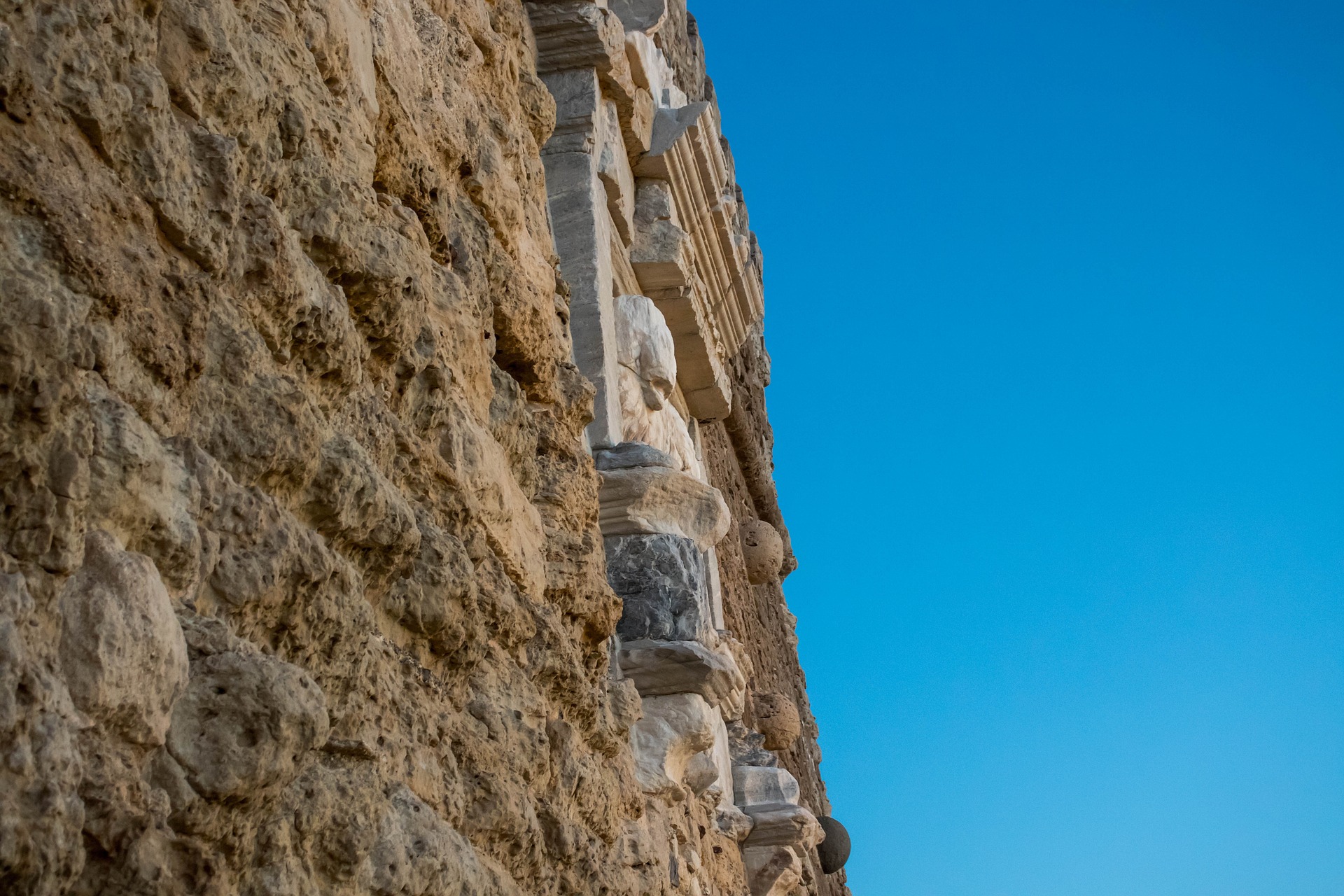
Ancient Mediterranean Antiquities
Ancient Mediterranean Antiquities
Cruise overview
WHY BOOK WITH US?
- ✔ The Deluxe Cruises’ team has extensive experience in ultra-luxury cruising.
- ✔ Call now to speak to our helpful and experienced Cruise Concierge team.
- ✔ Enjoy our Unique Deluxe Cruises Bonus for substantial savings.
- ✔ Our team will tailor your holiday to your exacting requirements.
- ✔ As agents, we work under the protection of each cruise lines ABTA / ATOL licences
About Civitavecchia
Italy's vibrant capital lives in the present, but no other city on earth evokes its past so powerfully. For over 2,500 years, emperors, popes, artists, and common citizens have left their mark here. Archaeological remains from ancient Rome, art-stuffed churches, and the treasures of Vatican City vie for your attention, but Rome is also a wonderful place to practice the Italian-perfected il dolce far niente, the sweet art of idleness. Your most memorable experiences may include sitting at a caffè in the Campo de' Fiori or strolling in a beguiling piazza.
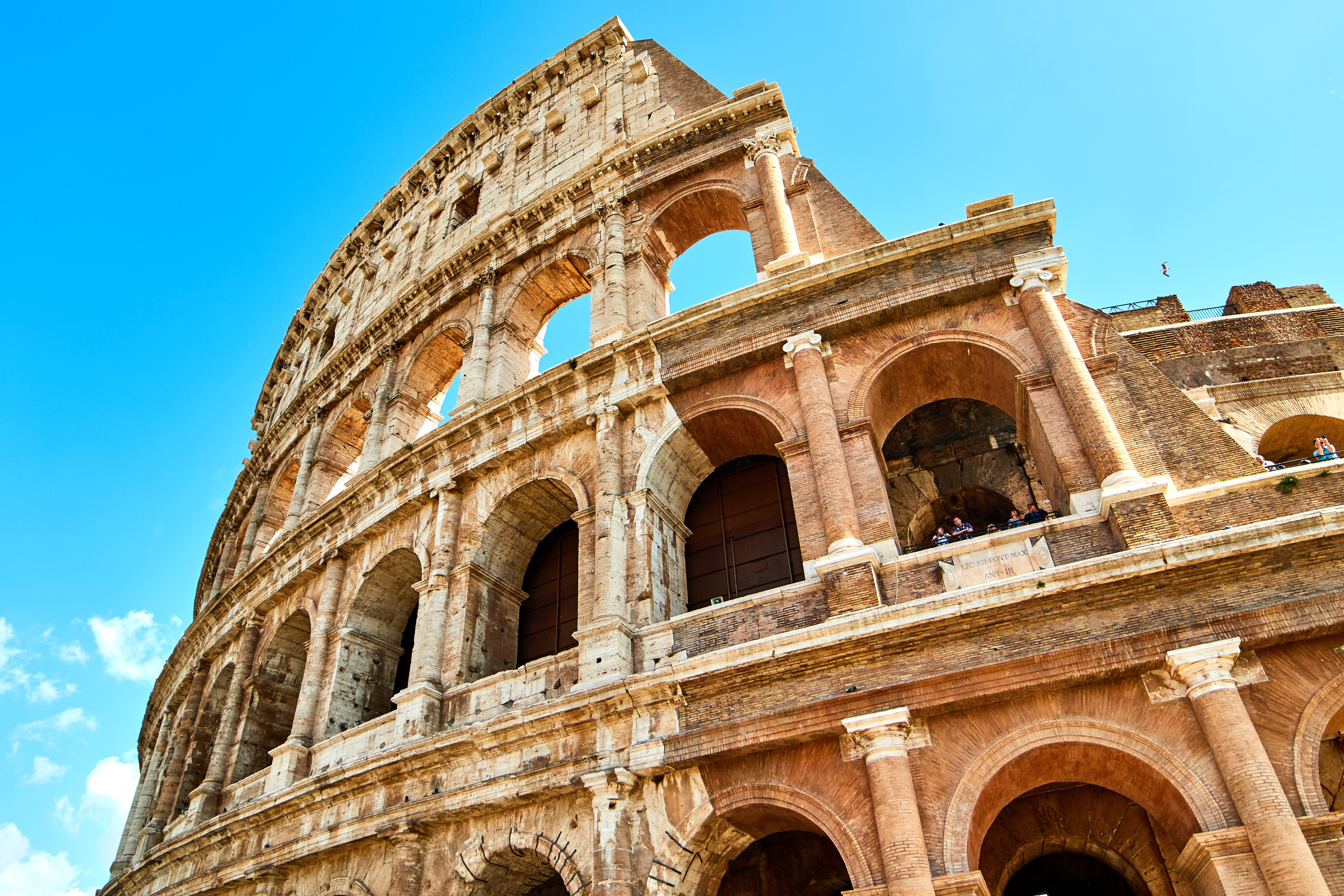
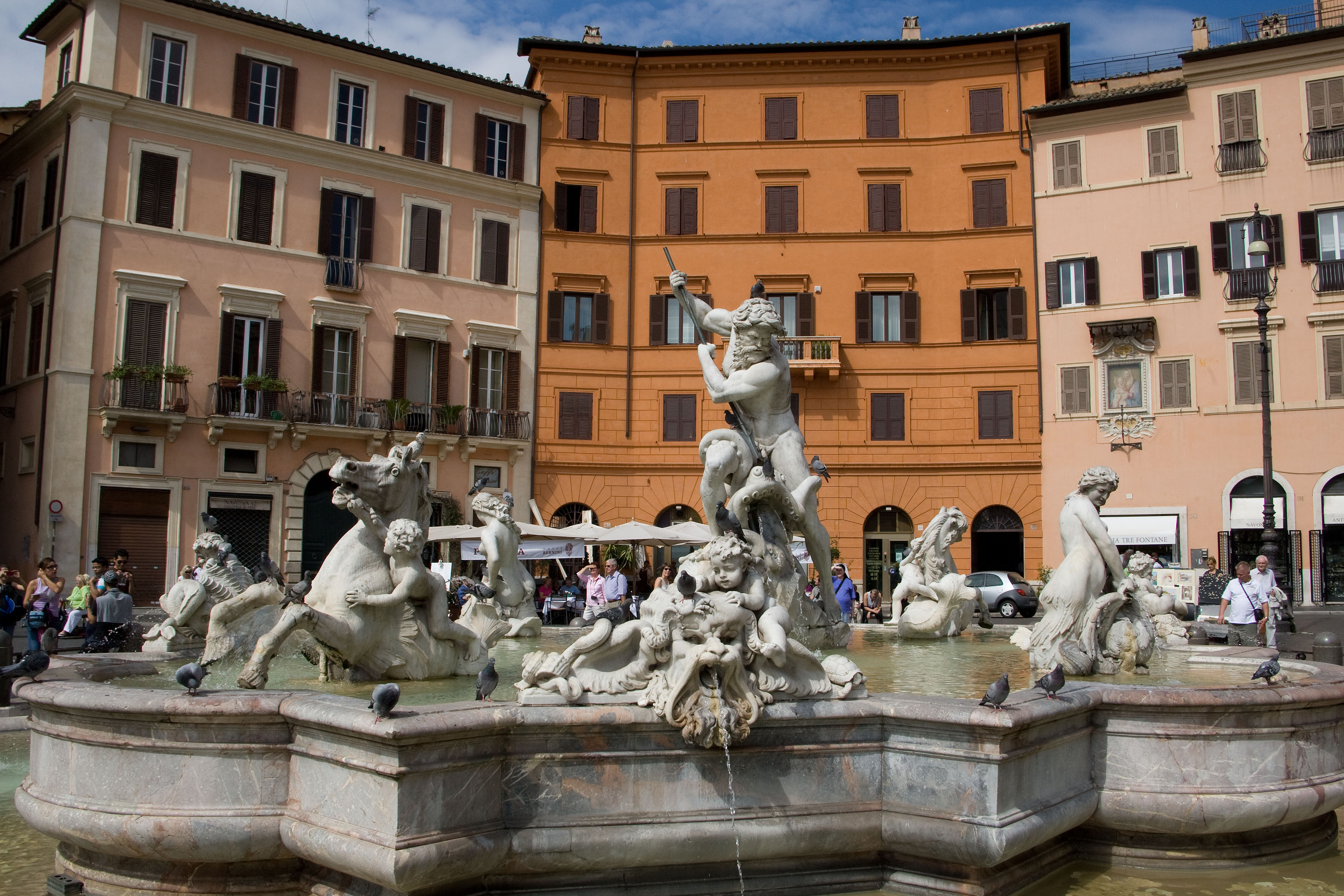
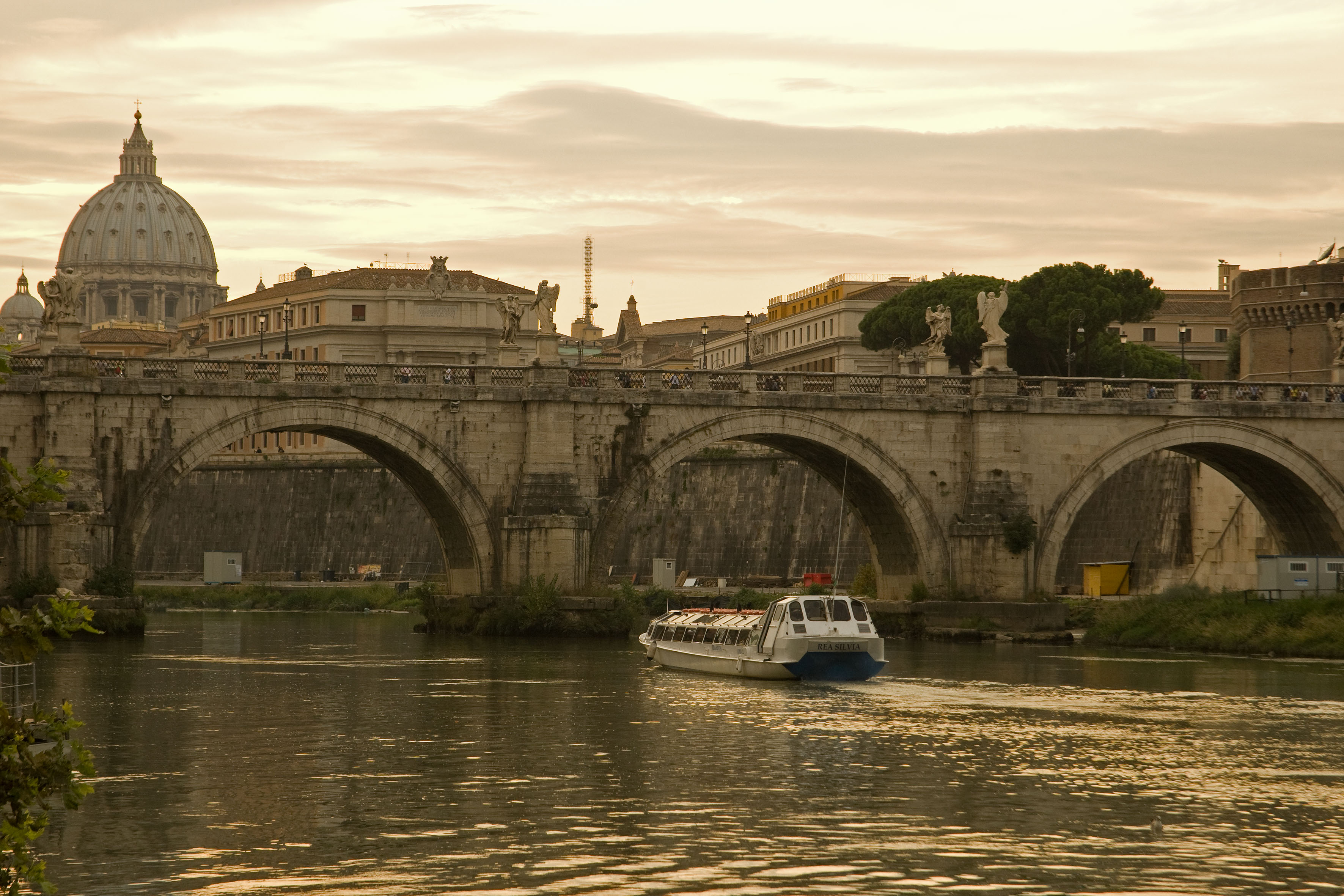
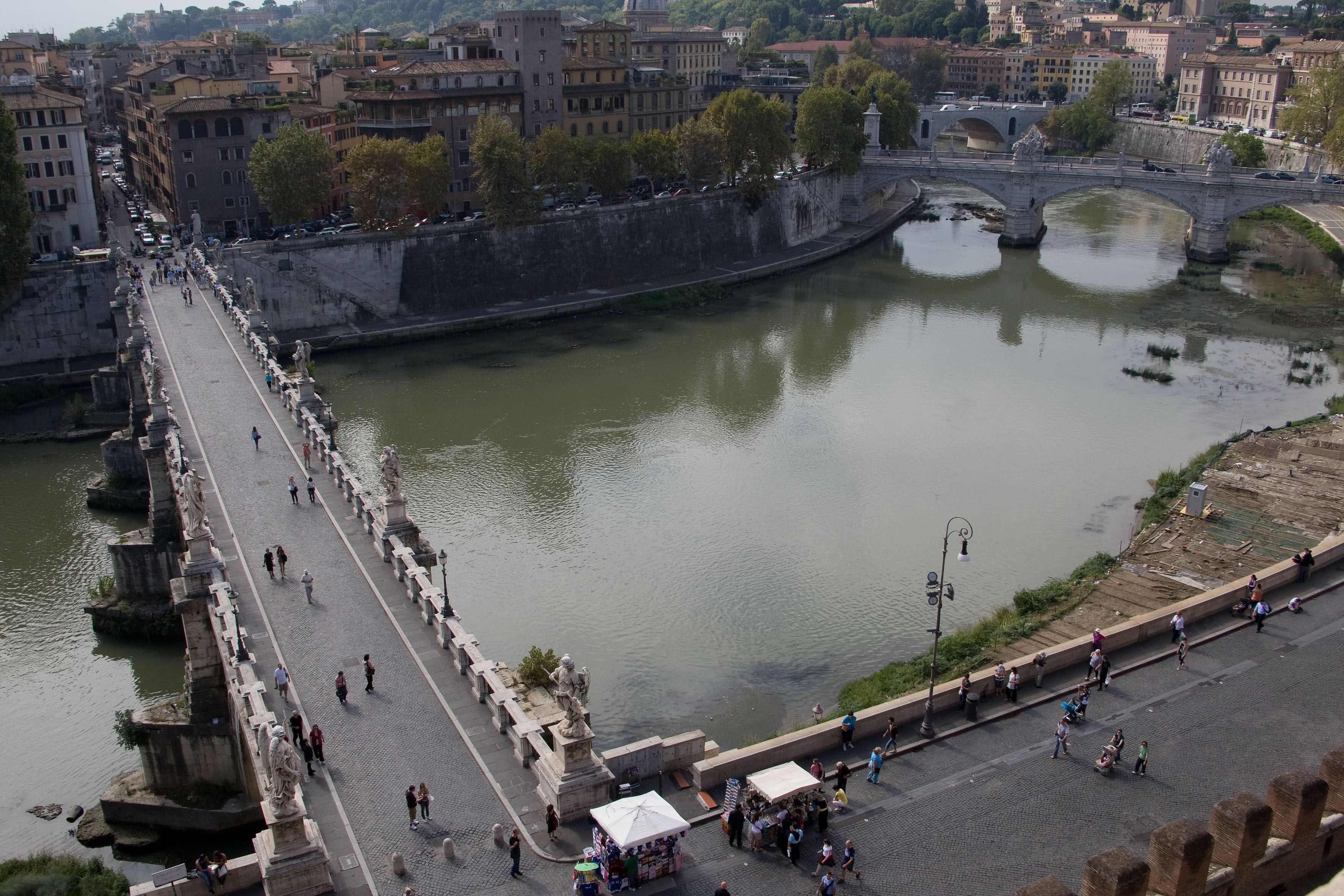
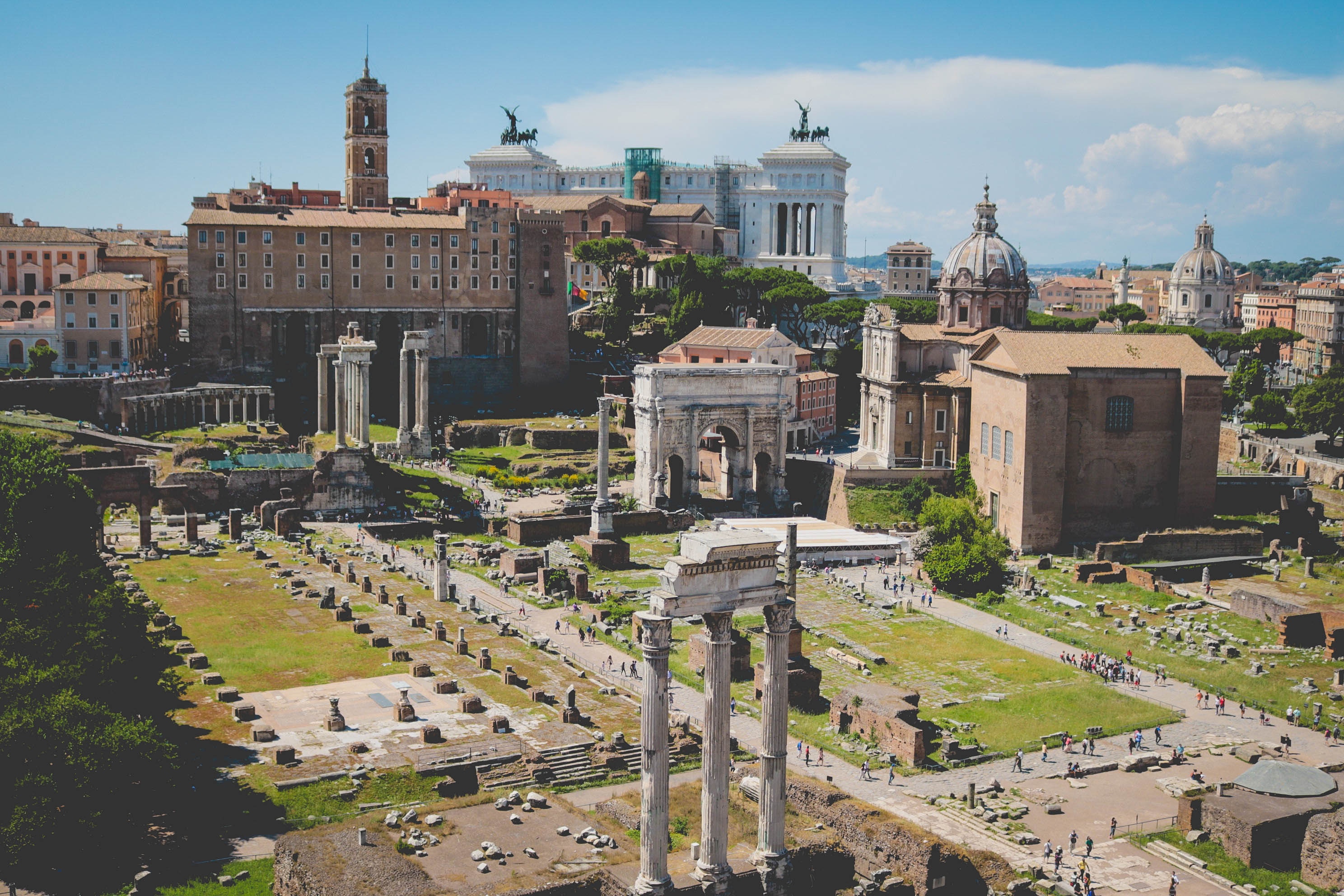
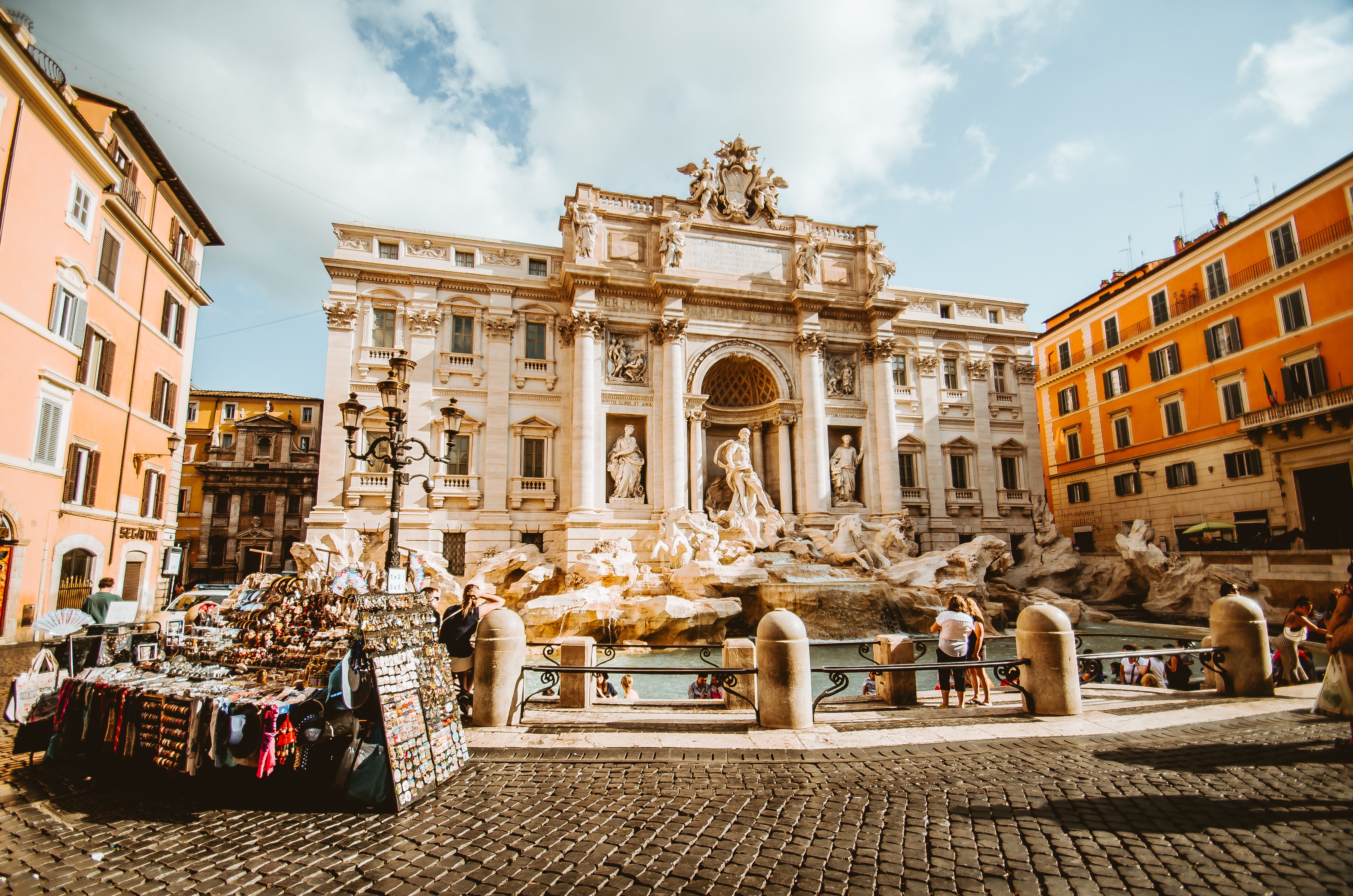
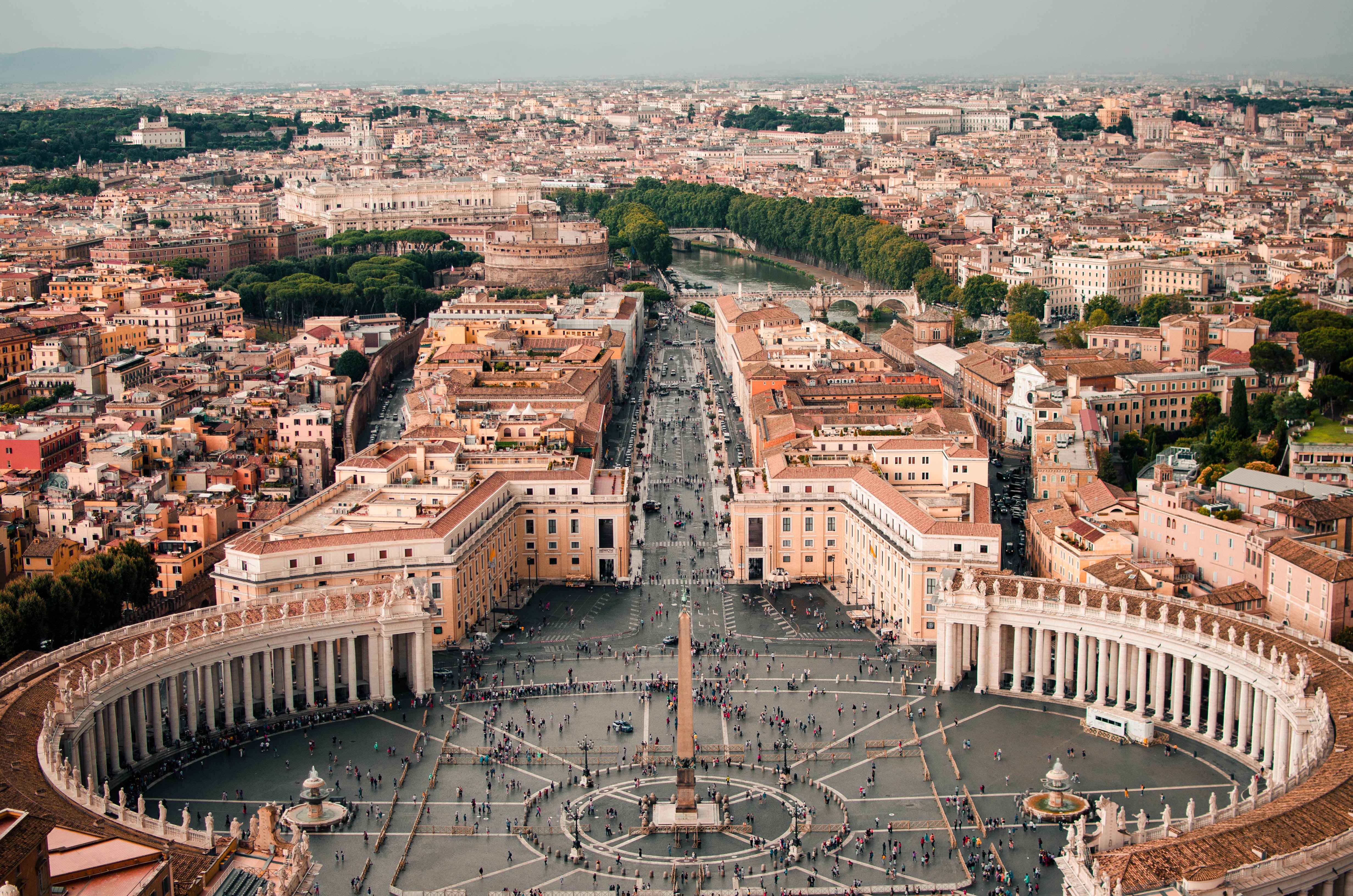
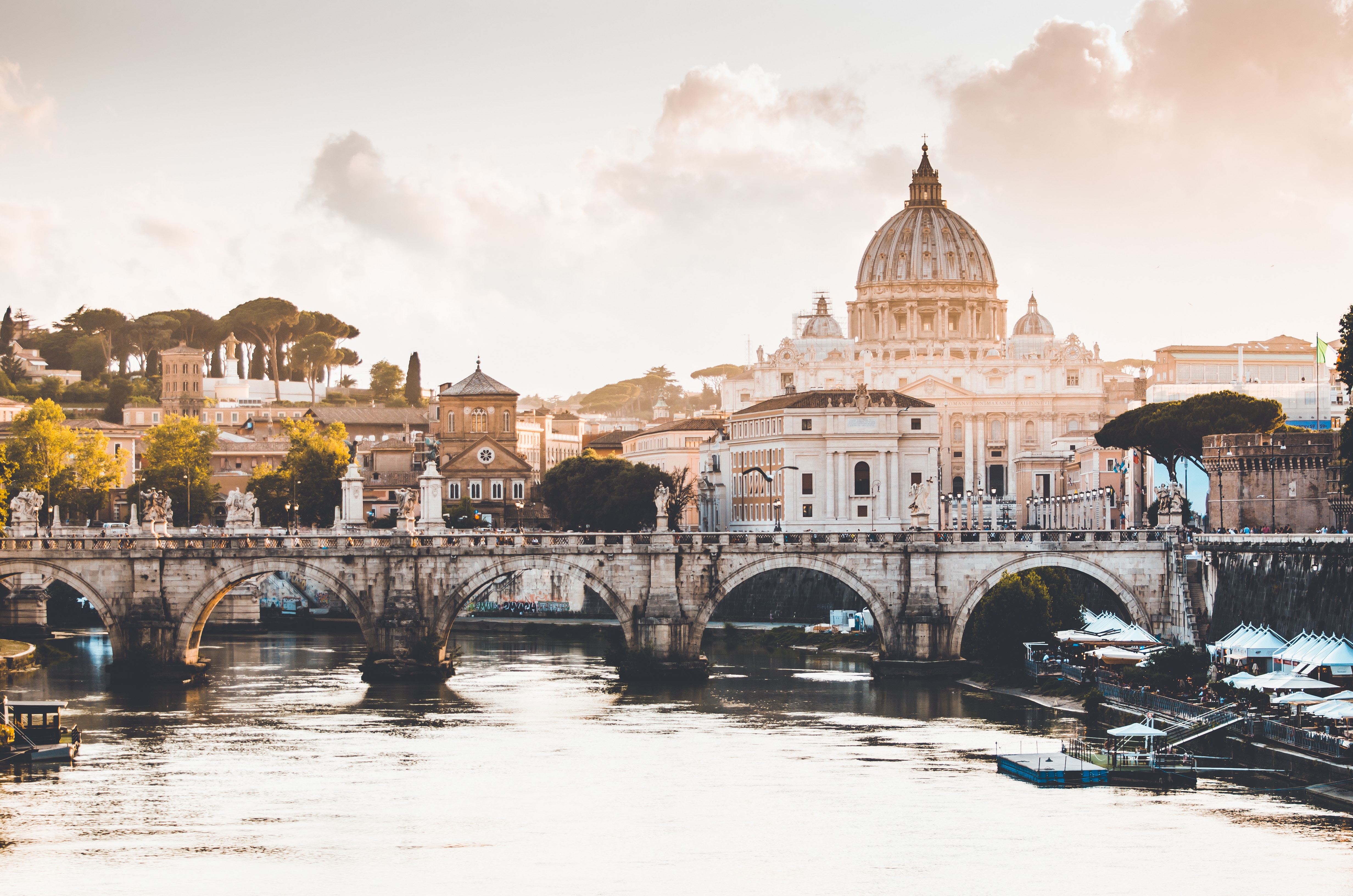
About Naples
Naples, in the Campania region, is Italy's third largest city. Its claim to fame is the spectacular location along one of the world's most splendid bays, backed by the perfect cone of Mount Vesuvius. In addition to its beautiful setting, Naples' surprises with other outstanding attractions such as the Royal Palace, San Carlos Opera House, the impressive National Archaeological Museum and the Castel Nuovo, dating from the 13th-century. The city's central area is best explored on foot. Chaotic traffic conditions make driving around the city a very frustrating experience. Naples provides a convenient starting point for trips to such favored destinations as Pompeii, Herculaneum and Mount Vesuvius. The Isle of Capri can be reached via a 45-minute hydrofoil service. The region of Campania was home to Greeks settlers some 300 years before Rome was founded. Pompeii, too, was a Greek town before being conquered by the Romans during the 5th century BC. It was under the Romans that Pompeii flourished and grew prosperous. When Mount Vesuvius erupted in 79 AD, the population of 20,000 was wiped out, but dozens of buildings were preserved under layers of cinder more than 20 feet deep. The most important finds from Pompeii are displayed in Naples' National Archaeological Museum. A visit here will no doubt enhance a visit to ancient Pompeii.
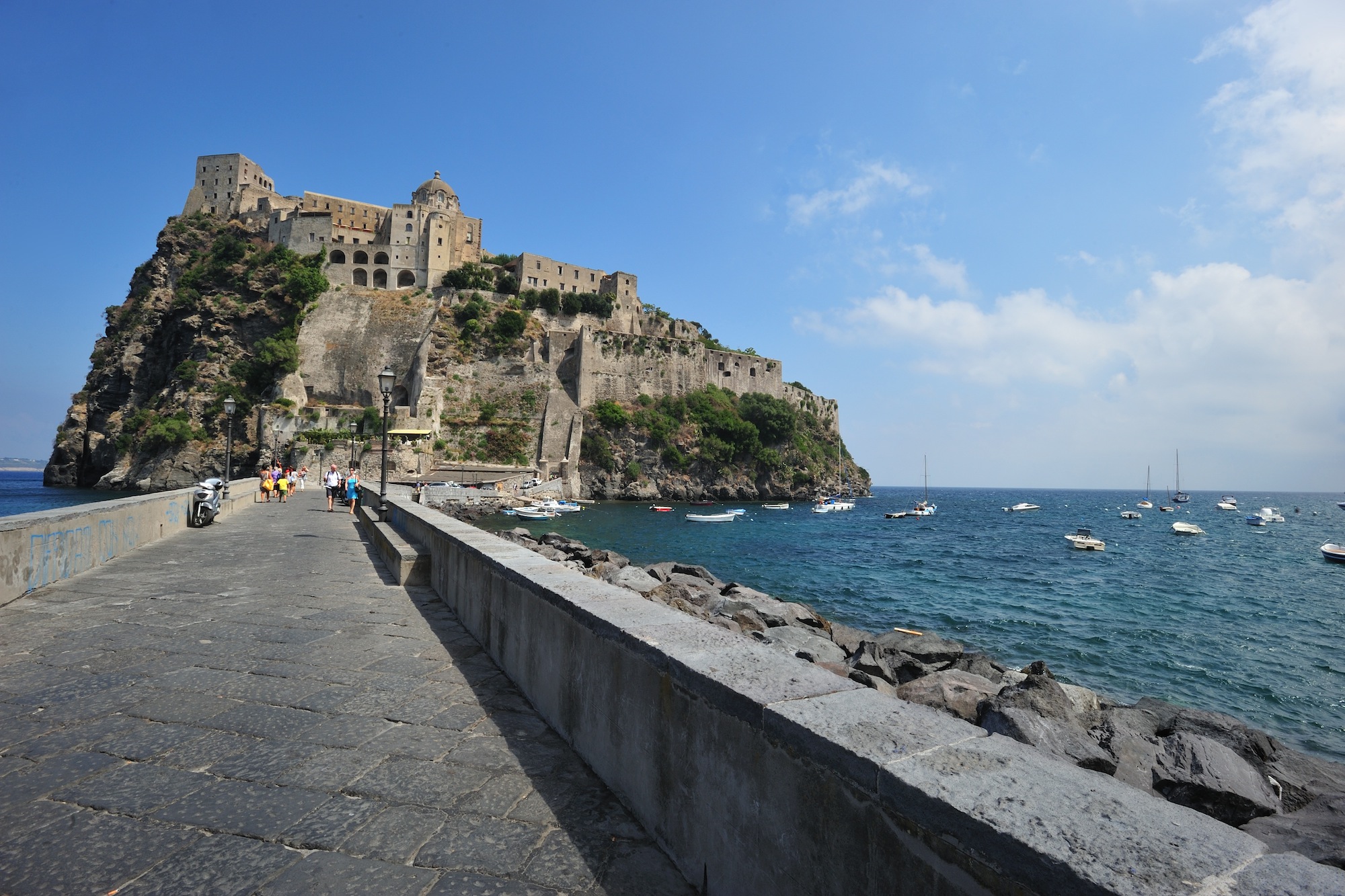
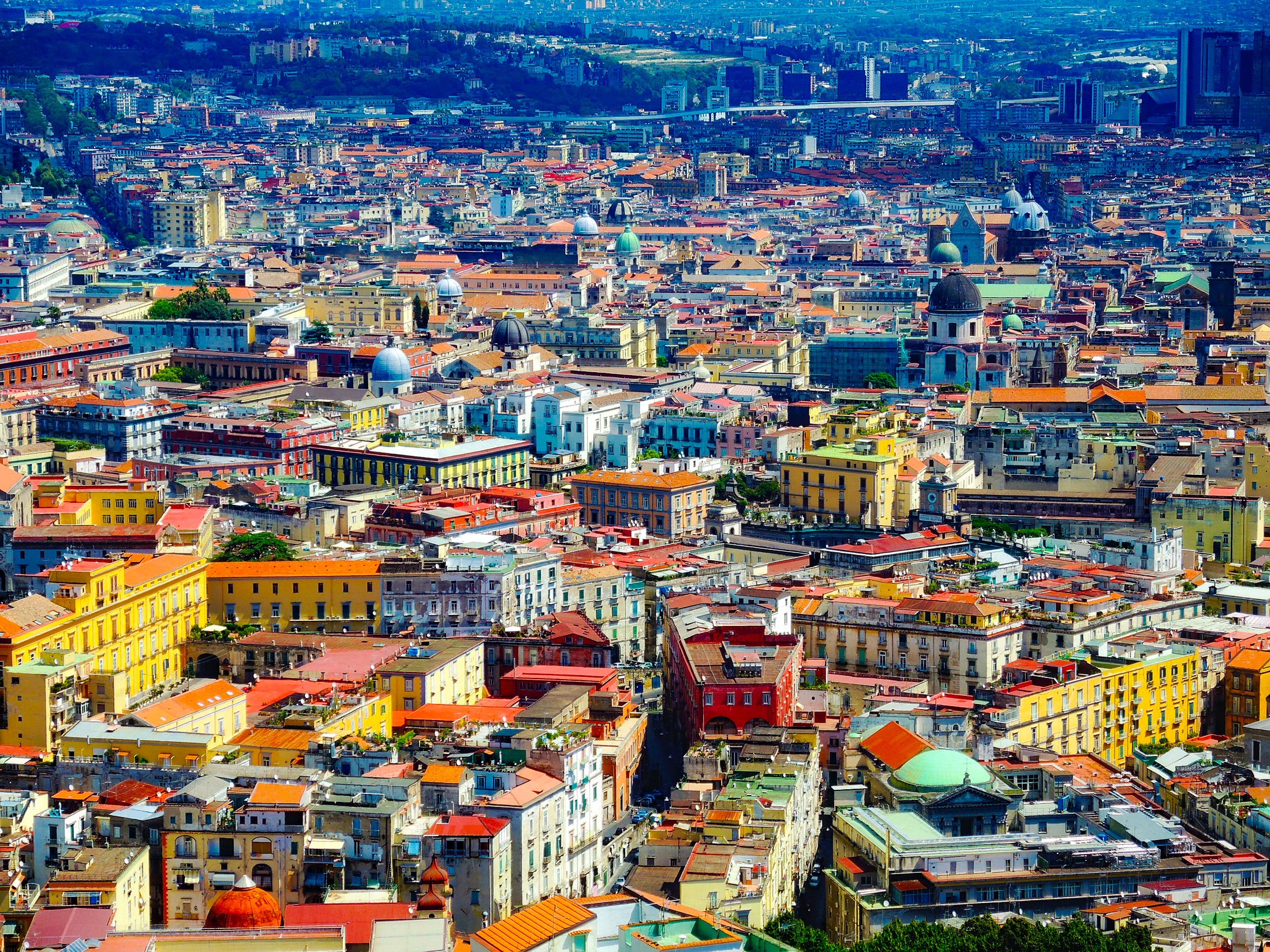

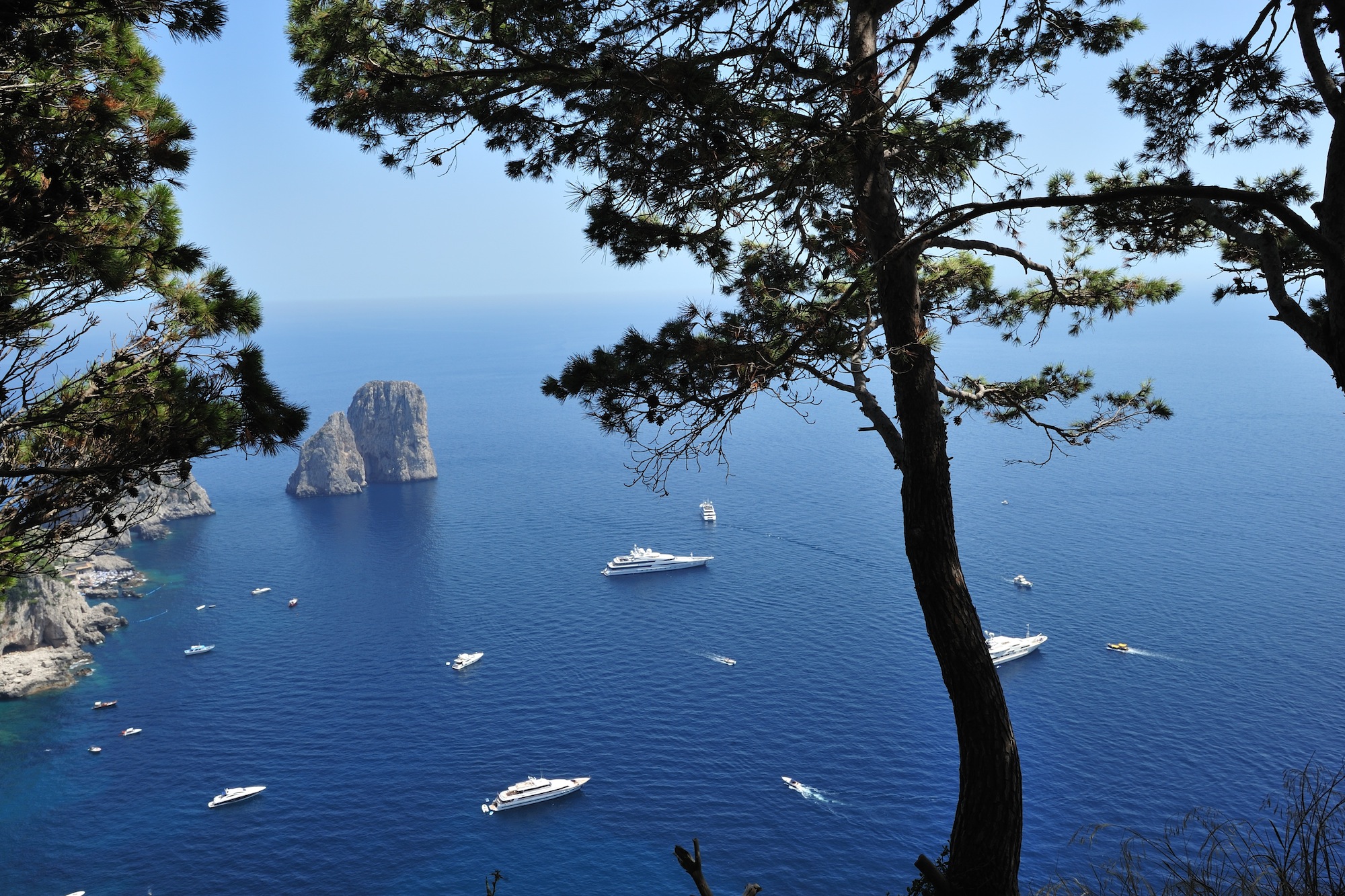
About Messina
Home to the Museo Regionale of Messina, known for featuring two of Caravaggio's paintings, the city is also famous for having been the capital of the ancient kingdom of Sicily.
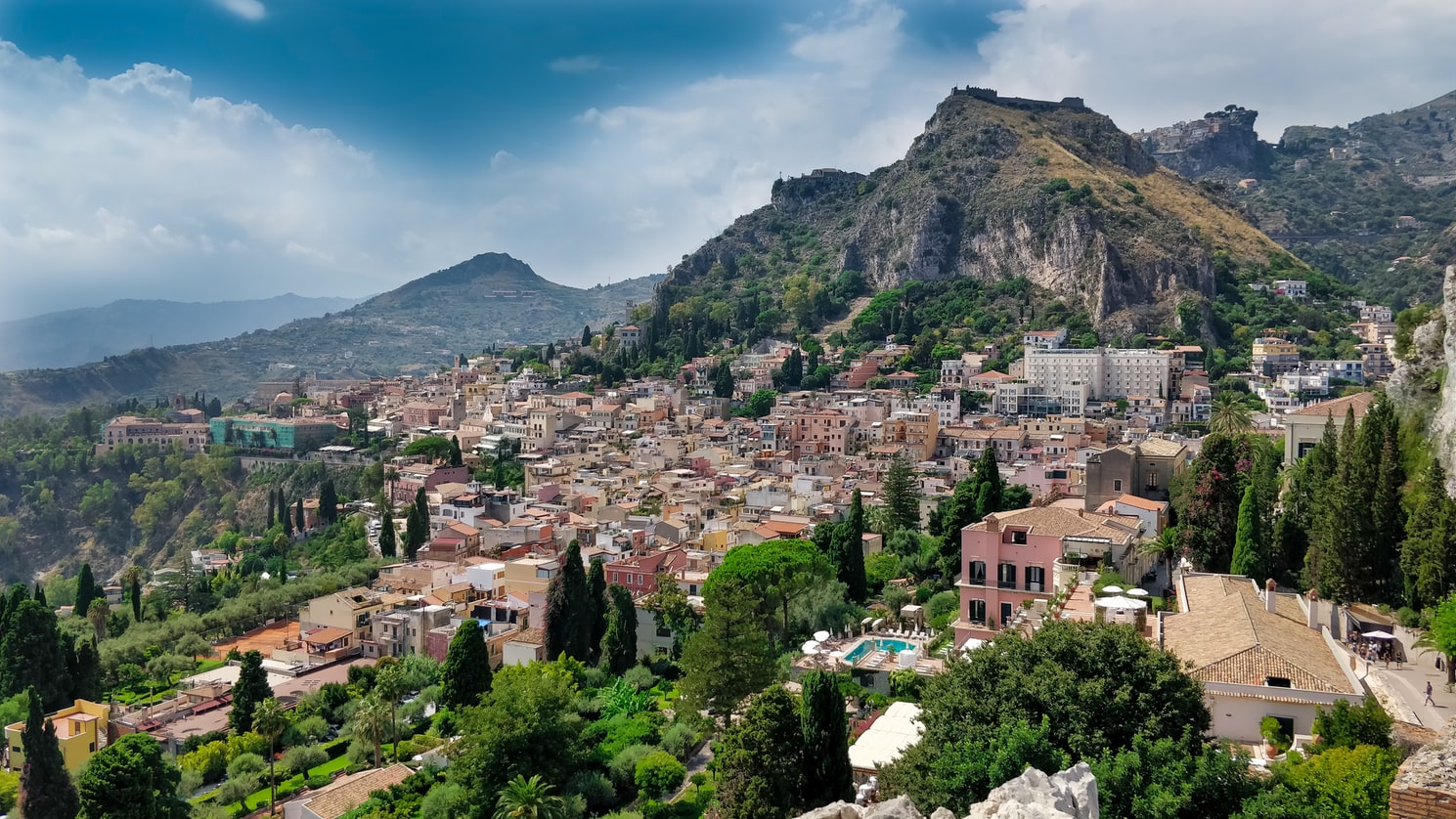
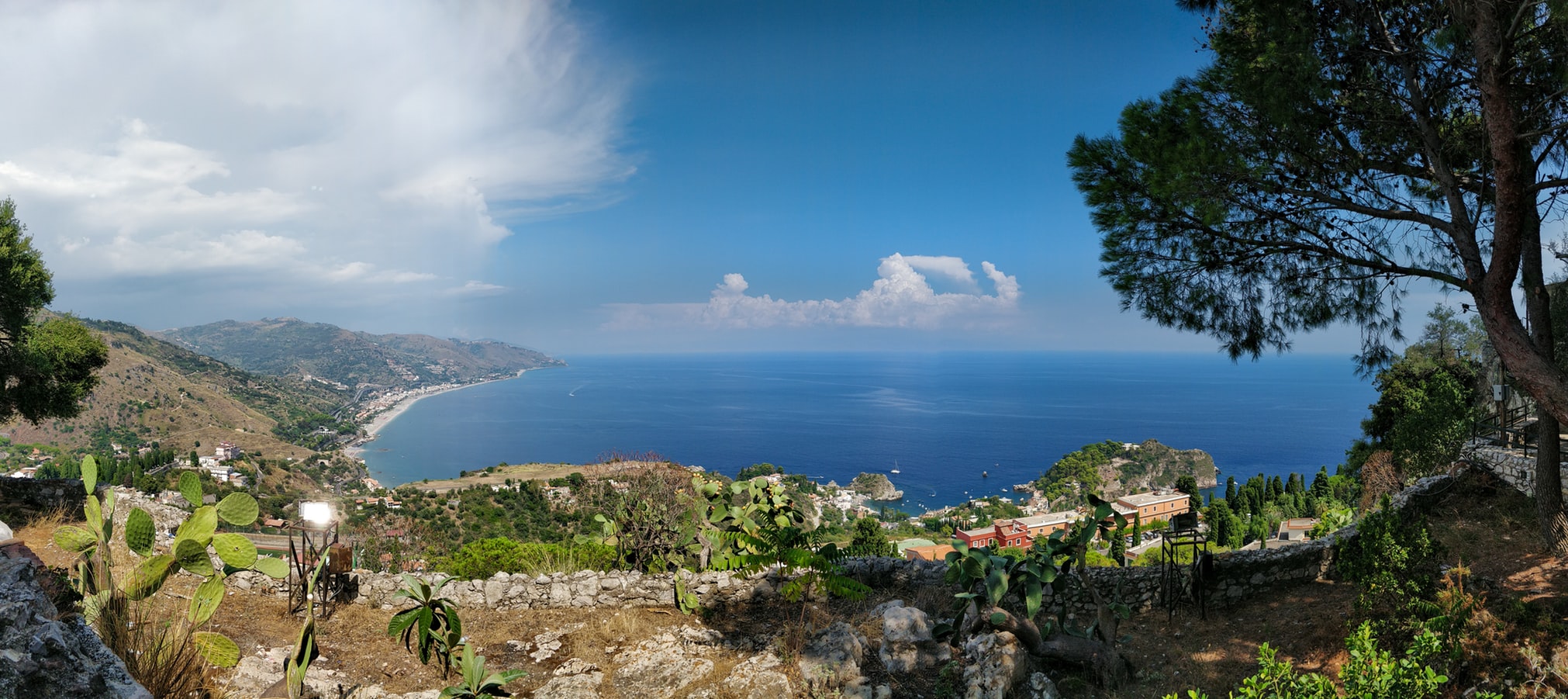
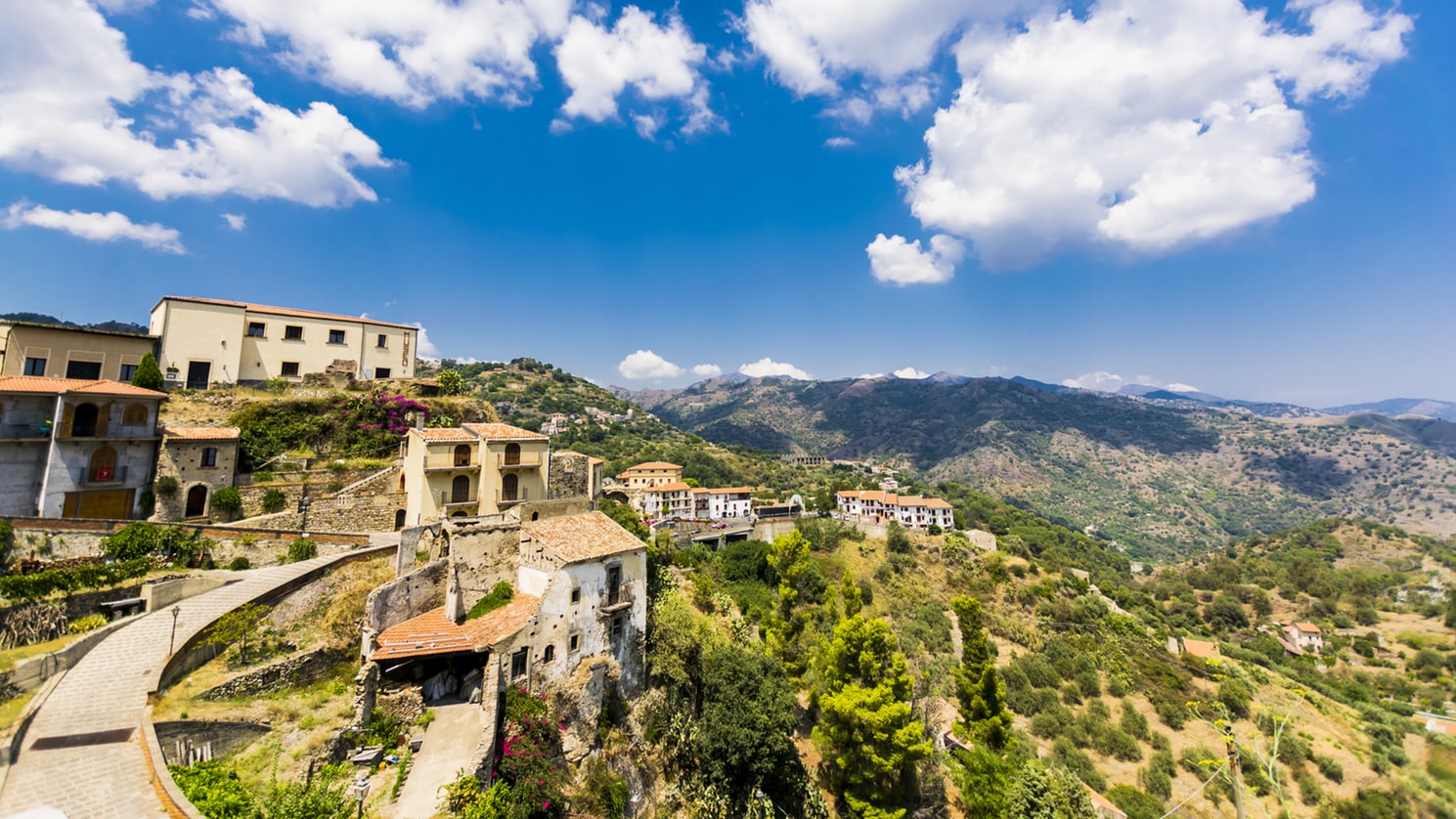
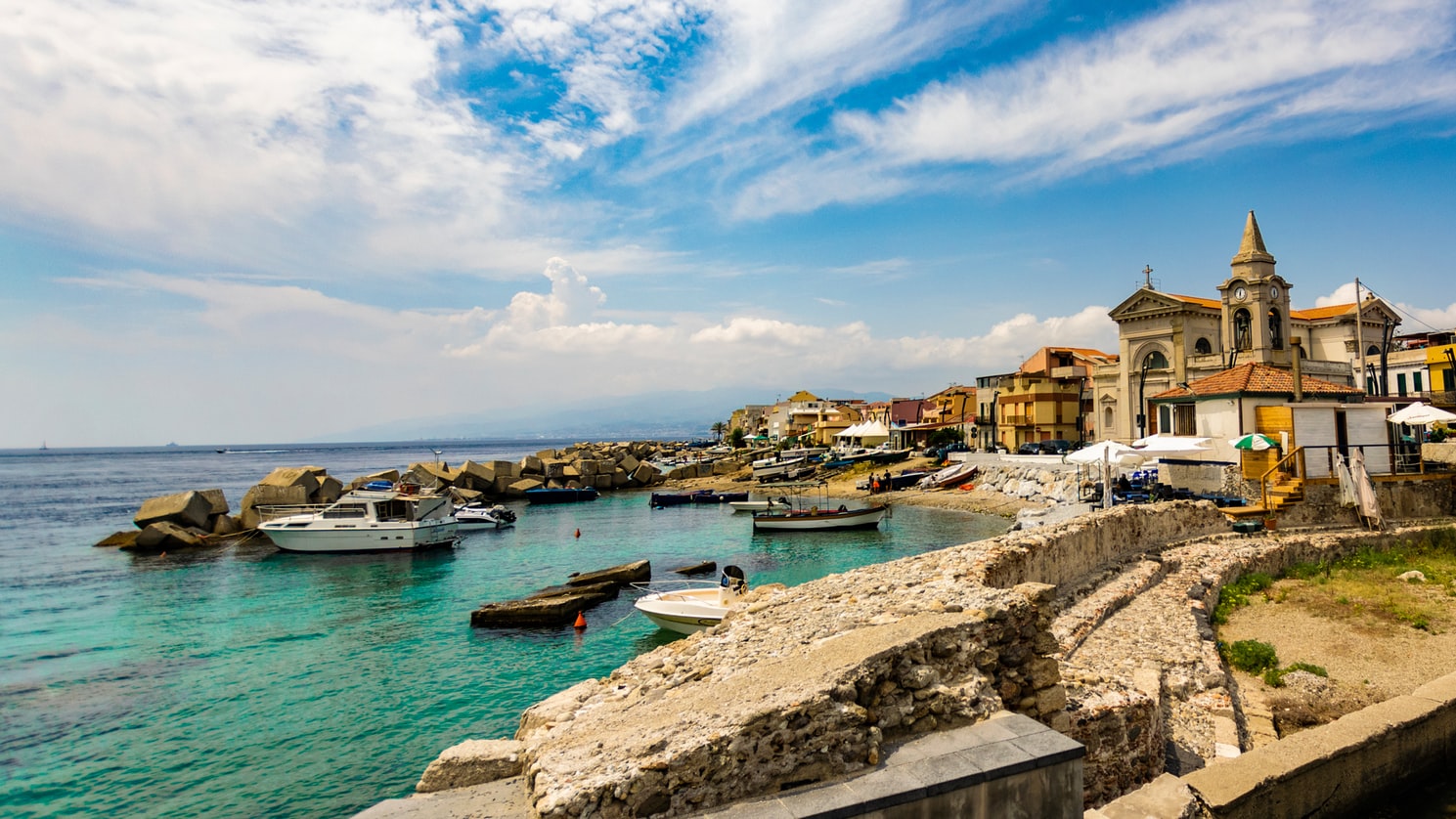
About Suda Bay, Crete
A call at Souda Bay promises sparkling beaches, engrossing history and no shortage of proud Maritime tradition. You'll drift past the fortified walls of Leon and Souda islands as you enter this natural harbour, which gives you access to all of Crete’s wonders, including Chania’s collection of fascinating museums, uncovered archaeological sites, and glorious Venetian architecture. Souda Bay's strategic positioning means it’s long been an important naval base – and Greek and UN bases still operate here today, on the northern rim of the bay. So it’s well worth travelling a little further out, to find heavenly beaches like the famous Elafonissi Beach - where pink sand and fizzing waves of crystal clear water, converge. The port here dates back to antiquity, when it was used to access the ancient city of Aptera. Visit the extraordinary archaeological site, to see the ruins of mighty empires – from the Romans to the Minoans – gradually emerging from the dusty ground, as excavations continue.
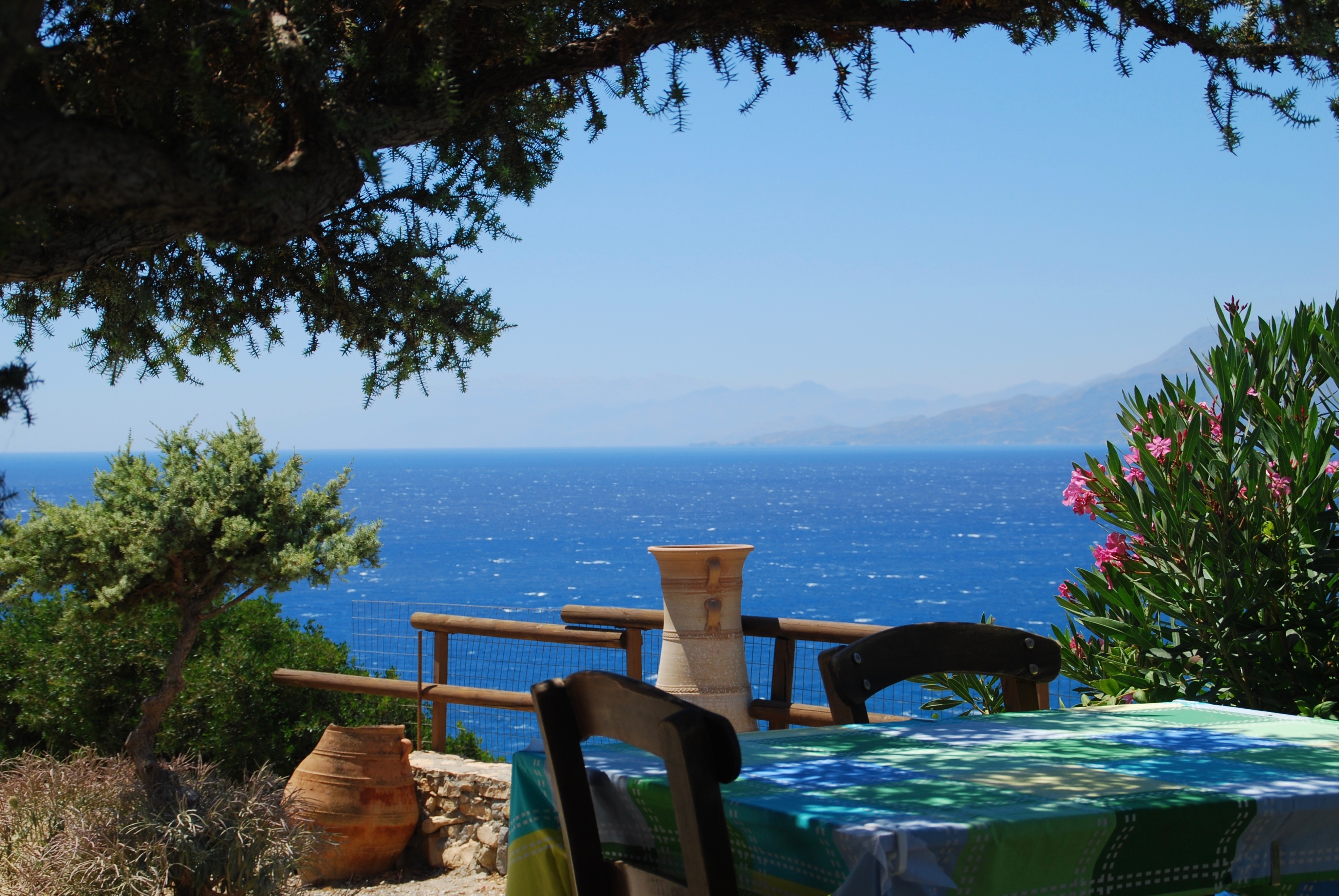
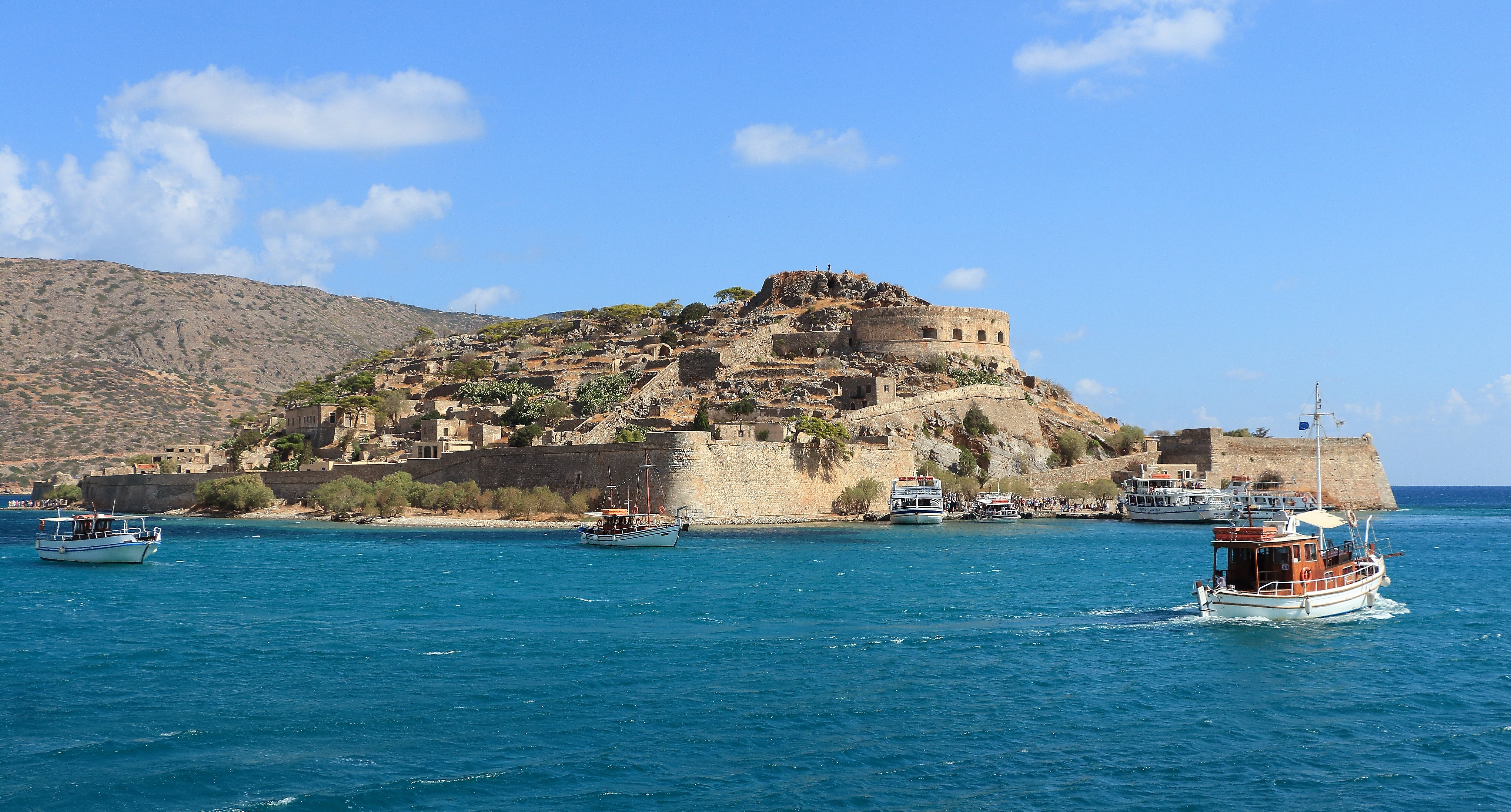
About Kusadasi
Whilst the busy resort town of Kusadasi offers much in the way of shopping and dining – not to mention a flourishing beach life scene, the real jewel here is Ephesus and the stunning ruined city that really take centre stage. With only 20% of the classical ruins having been excavated, this archaeological wonder has already gained the status as Europe’s most complete classical metropolis. And a metropolis it really is; built in the 10th century BC this UNESCO World Heritage site is nothing short of spectacular. Although regrettably very little remains of the Temple of Artemis (one of the seven wonders of the ancient world), the superb Library of Celsus’ façade is practically intact and it is one of life’s great joys to attend an evening performance in the illuminated ruins once all the tourists have left. The history of the city is fascinating and multi-layered and it is well worth reading up on this beforehand if a visit is planned. Another point of interest for historians would be the house of the Virgin Mary, located on the romantically named Mount Nightingale and just nine kilometres away from Ephesus proper. Legend has it that Mary (along with St. John) spent her final years here, secluded from the rest of the population, spreading Christianity. An edifying experience, even for non-believers. For the less historical minded amongst you, Kusadasi offers plenty in the way of activities. After a stroll through the town, jump in a taxi to Ladies’ Beach (men are allowed), sample a Turkish kebap on one of the many beachfront restaurants and enjoy the clement weather. If you do want to venture further afield, then the crystal clear beaches of Guzelcamli (or the Millipark), the cave of Zeus and the white scalloped natural pools at Pamukkale, known as Cleopatra’s pools, are definitely worth a visit.
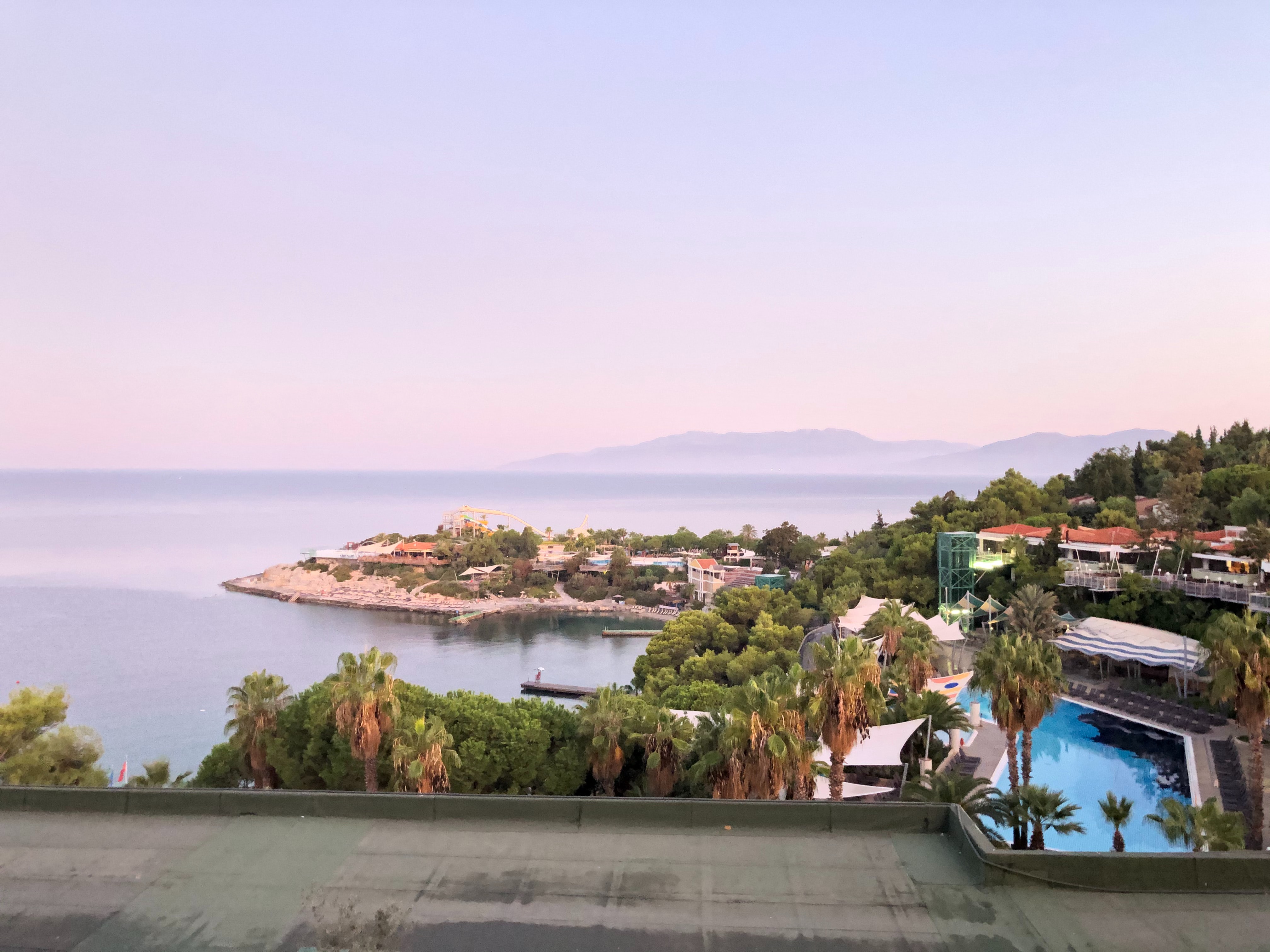

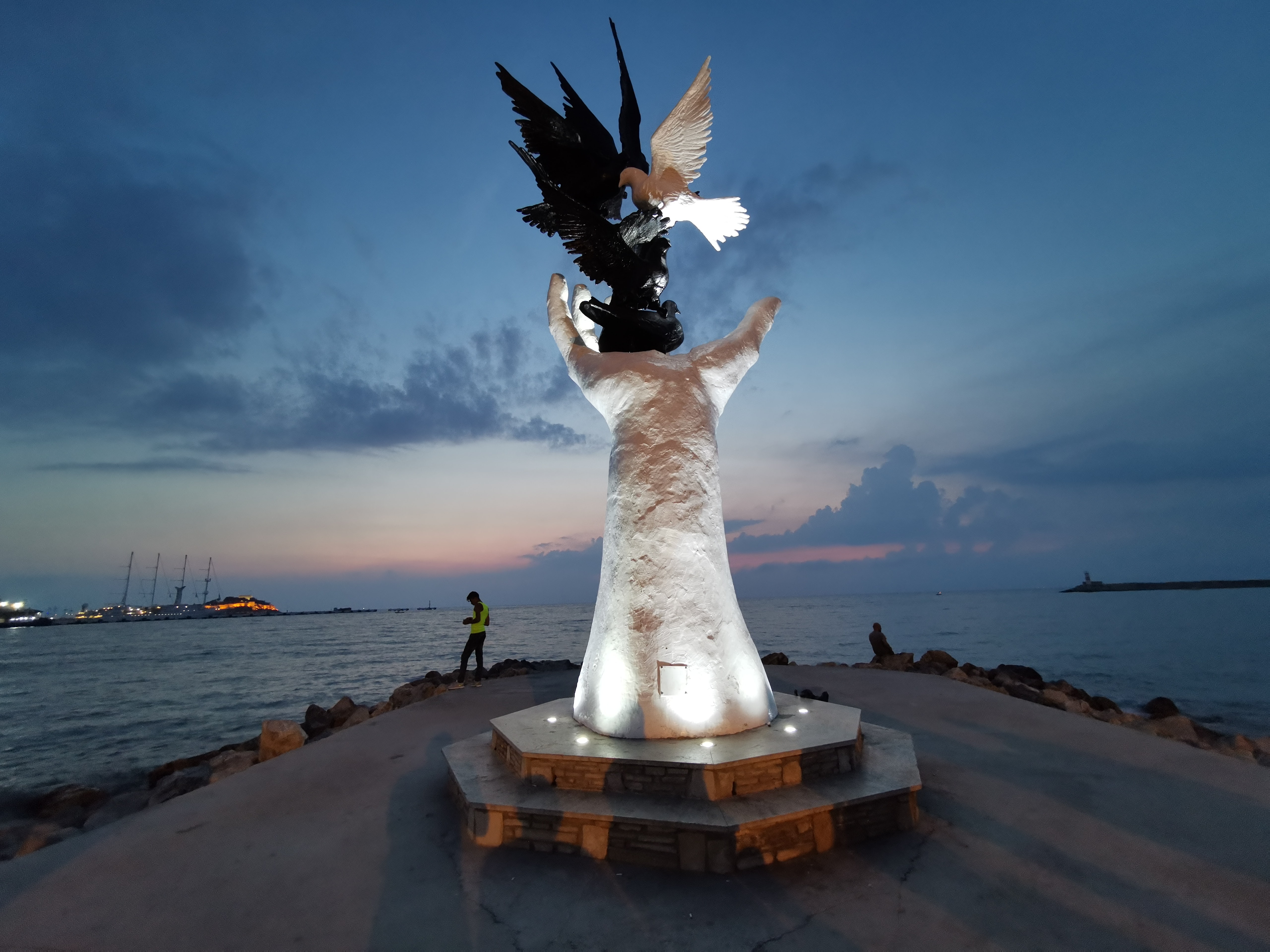
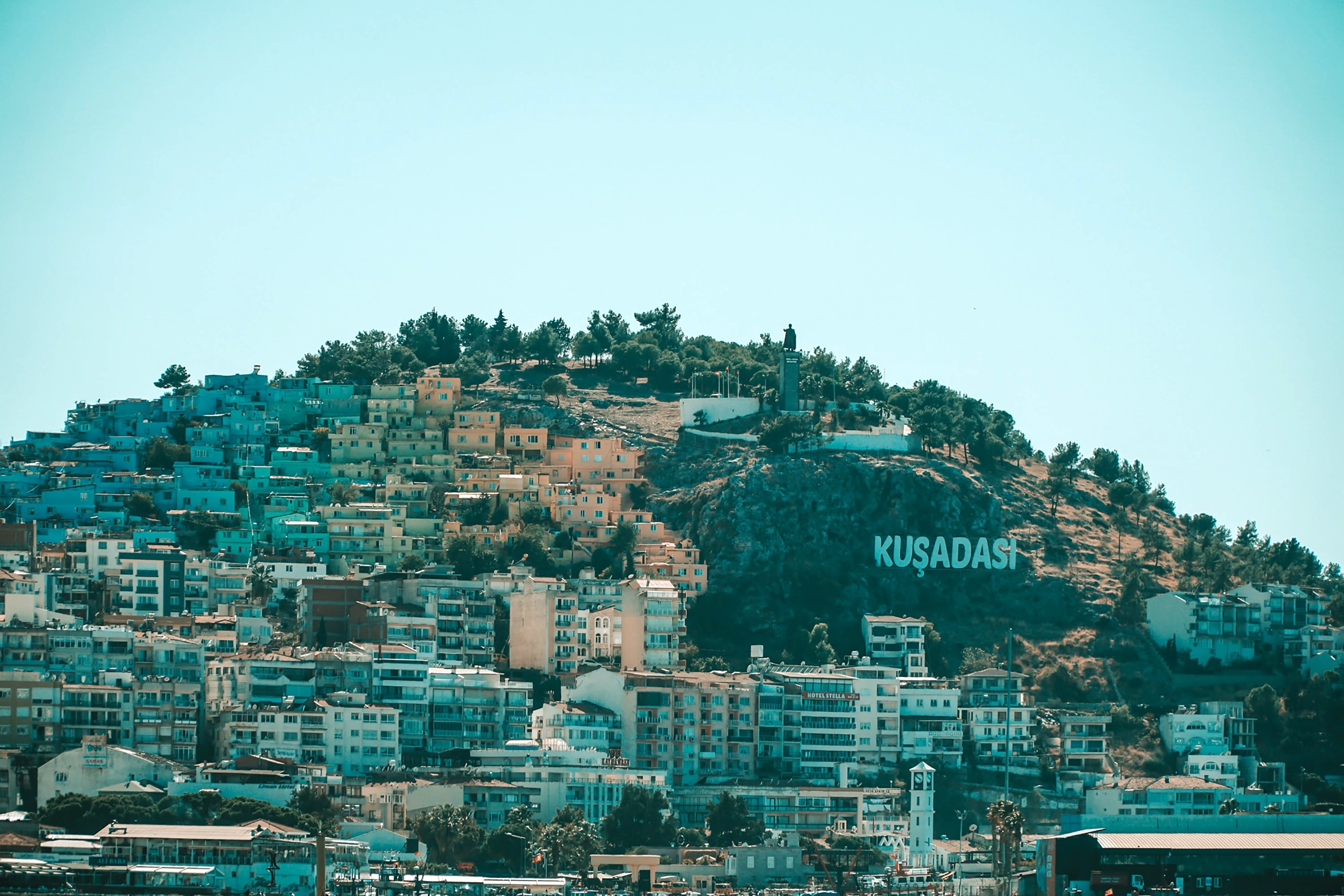

About Piraeus
It's no wonder that all roads lead to the fascinating and maddening metropolis of Athens. Lift your eyes 200 feet above the city to the Parthenon, its honey-color marble columns rising from a massive limestone base, and you behold architectural perfection that has not been surpassed in 2,500 years. But, today, this shrine of classical form dominates a 21st-century boomtown. To experience Athens—Athína in Greek—fully is to understand the essence of Greece: ancient monuments surviving in a sea of cement, startling beauty amid the squalor, tradition juxtaposed with modernity. Locals depend on humor and flexibility to deal with the chaos; you should do the same. The rewards are immense. Although Athens covers a huge area, the major landmarks of the ancient Greek, Roman, and Byzantine periods are close to the modern city center. You can easily walk from the Acropolis to many other key sites, taking time to browse in shops and relax in cafés and tavernas along the way. From many quarters of the city you can glimpse "the glory that was Greece" in the form of the Acropolis looming above the horizon, but only by actually climbing that rocky precipice can you feel the impact of the ancient settlement. The Acropolis and Filopappou, two craggy hills sitting side by side; the ancient Agora (marketplace); and Kerameikos, the first cemetery, form the core of ancient and Roman Athens. Along the Unification of Archaeological Sites promenade, you can follow stone-paved, tree-lined walkways from site to site, undisturbed by traffic. Cars have also been banned or reduced in other streets in the historical center. In the National Archaeological Museum, vast numbers of artifacts illustrate the many millennia of Greek civilization; smaller museums such as the Goulandris Museum of Cycladic Art Museum and the Byzantine and Christian Museum illuminate the history of particular regions or periods. Athens may seem like one huge city, but it is really a conglomeration of neighborhoods with distinctive characters. The Eastern influences that prevailed during the 400-year rule of the Ottoman Empire are still evident in Monastiraki, the bazaar area near the foot of the Acropolis. On the northern slope of the Acropolis, stroll through Plaka (if possible by moonlight), an area of tranquil streets lined with renovated mansions, to get the flavor of the 19th-century's gracious lifestyle. The narrow lanes of Anafiotika, a section of Plaka, thread past tiny churches and small, color-washed houses with wooden upper stories, recalling a Cycladic island village. In this maze of winding streets, vestiges of the older city are everywhere: crumbling stairways lined with festive tavernas; dank cellars filled with wine vats; occasionally a court or diminutive garden, enclosed within high walls and filled with magnolia trees and the flaming trumpet-shaped flowers of hibiscus bushes. Formerly run-down old quarters, such as Thission, Gazi and Psirri, popular nightlife areas filled with bars and mezedopoleia (similar to tapas bars), are now in the process of gentrification, although they still retain much of their original charm, as does the colorful produce and meat market on Athinas. The area around Syntagma Square, the tourist hub, and Omonia Square, the commercial heart of the city about 1 km (½ mi) northwest, is distinctly European, having been designed by the court architects of King Otho, a Bavarian, in the 19th century. The chic shops and bistros of ritzy Kolonaki nestle at the foot of Mt. Lycabettus, Athens's highest hill (909 feet). Each of Athens's outlying suburbs has a distinctive character: in the north is wealthy, tree-lined Kifissia, once a summer resort for aristocratic Athenians, and in the south and southeast lie Glyfada, Voula, and Vouliagmeni, with their sandy beaches, seaside bars, and lively summer nightlife. Just beyond the city's southern fringes is Piraeus, a bustling port city of waterside fish tavernas and Saronic Gulf views.

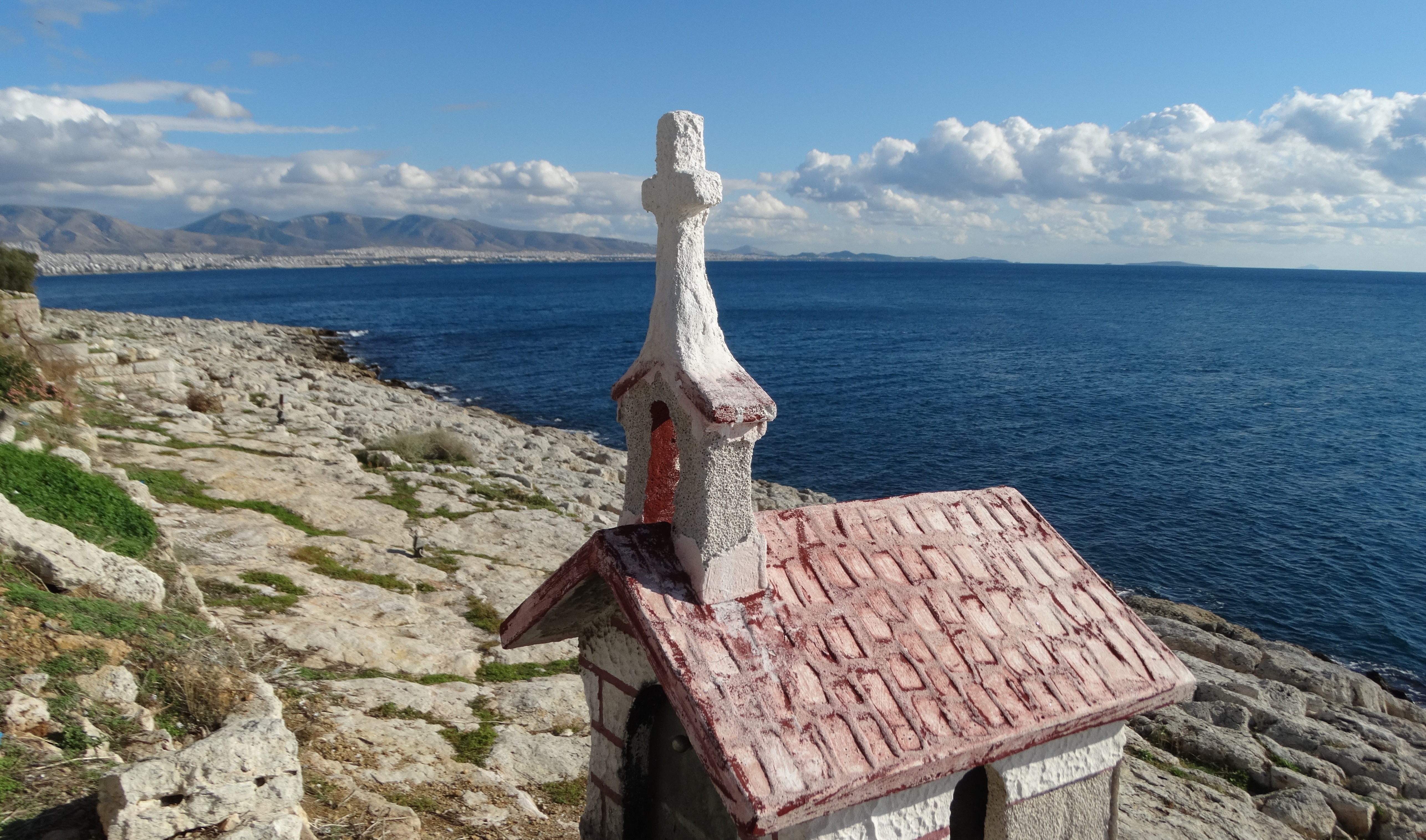
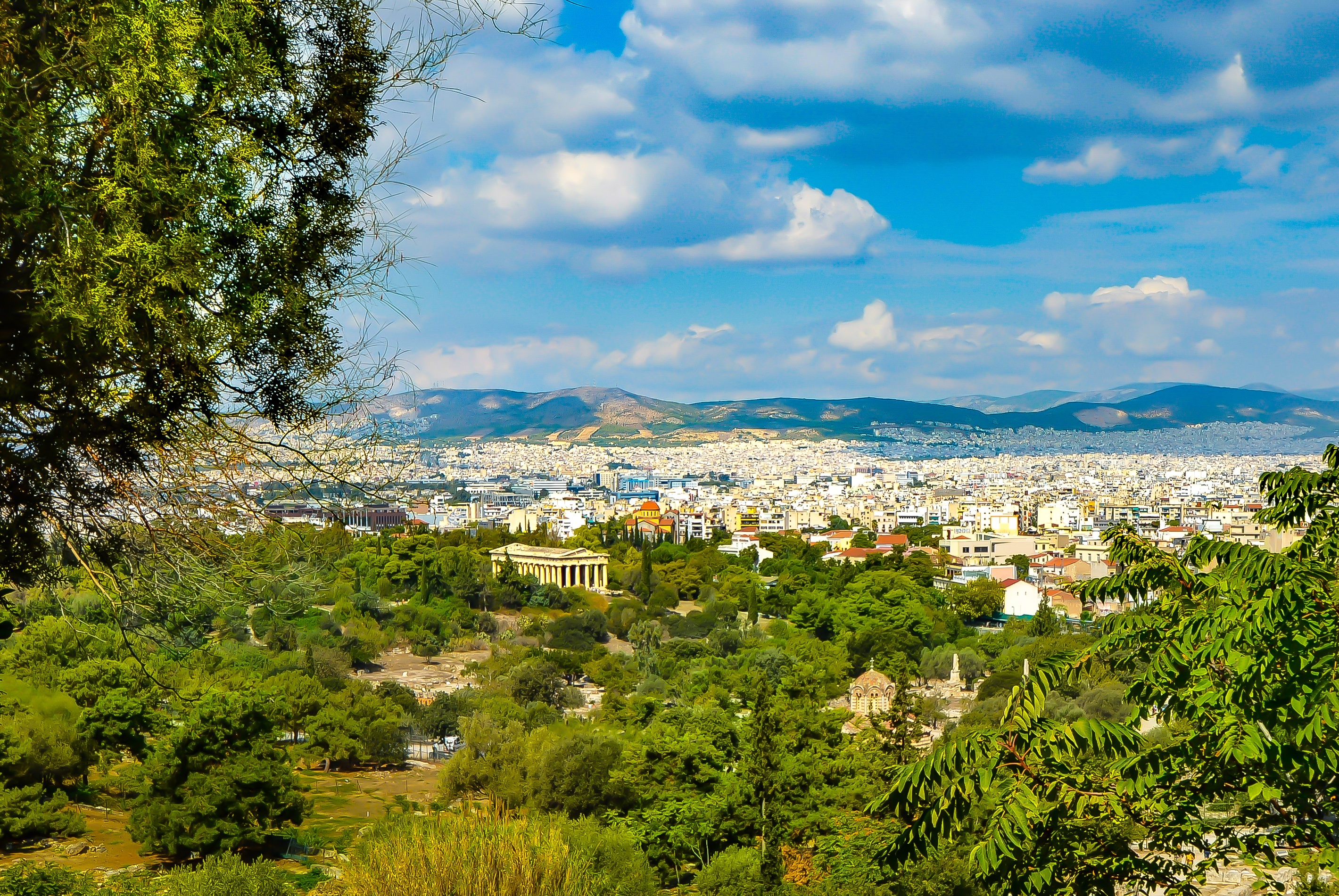
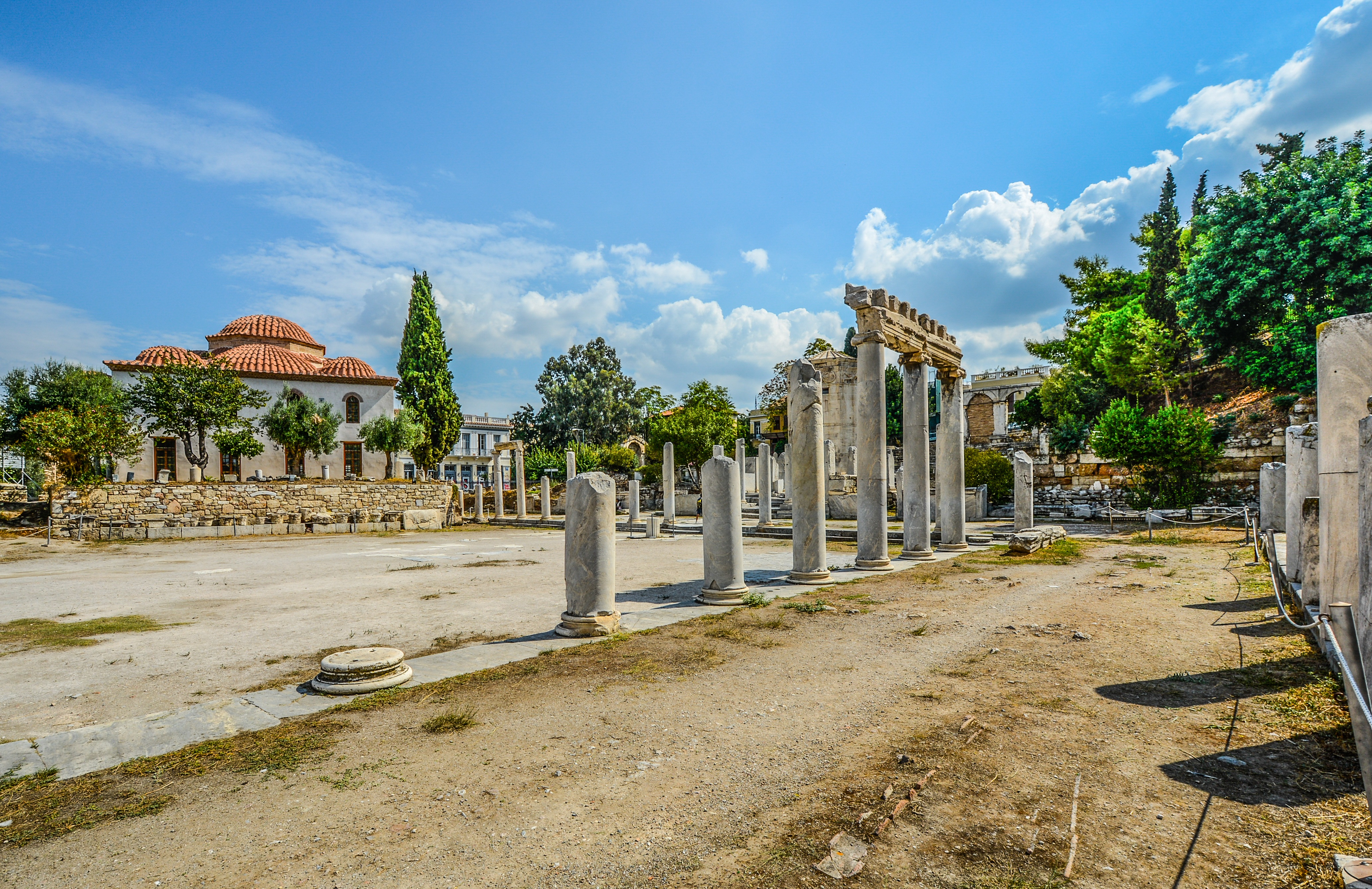
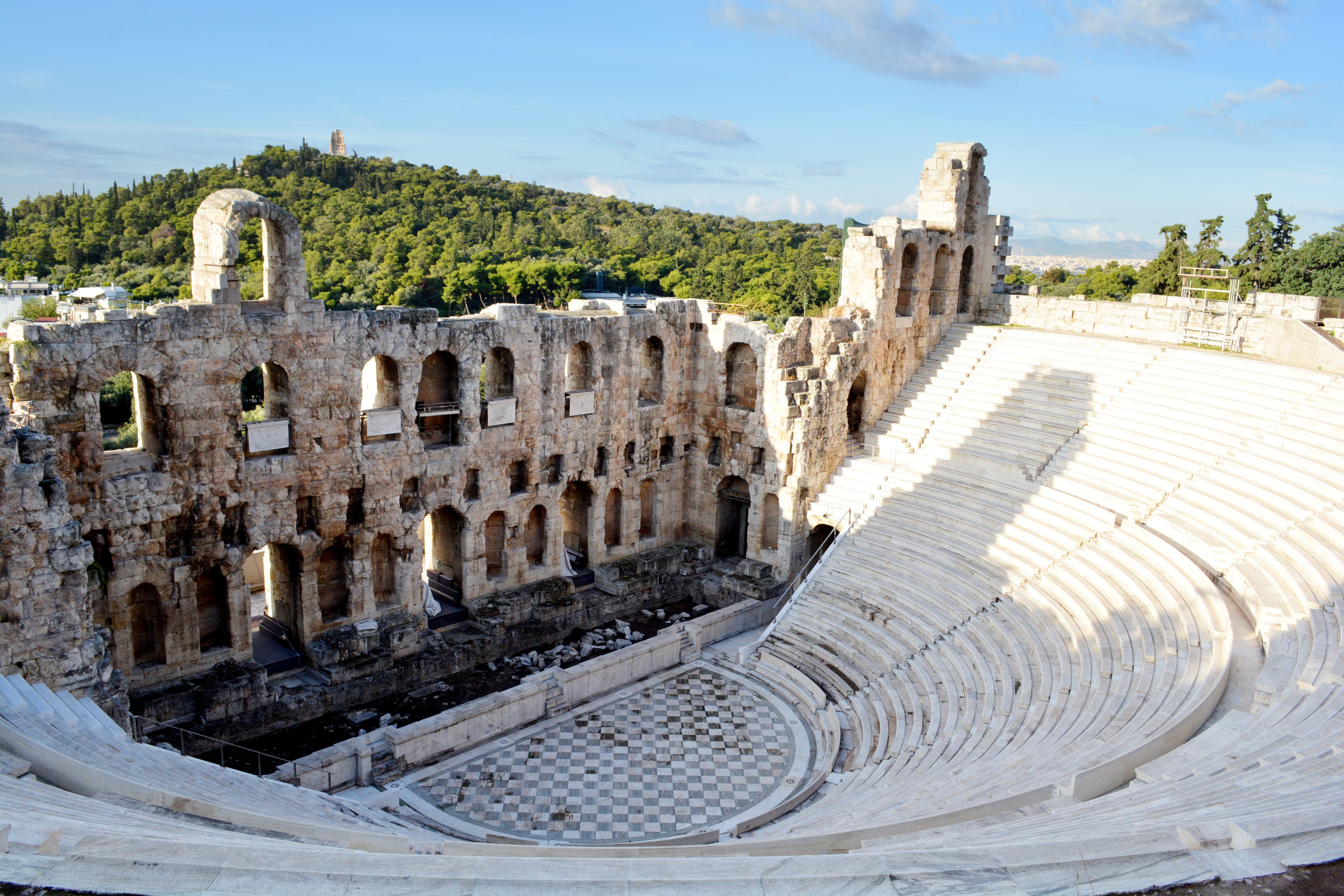
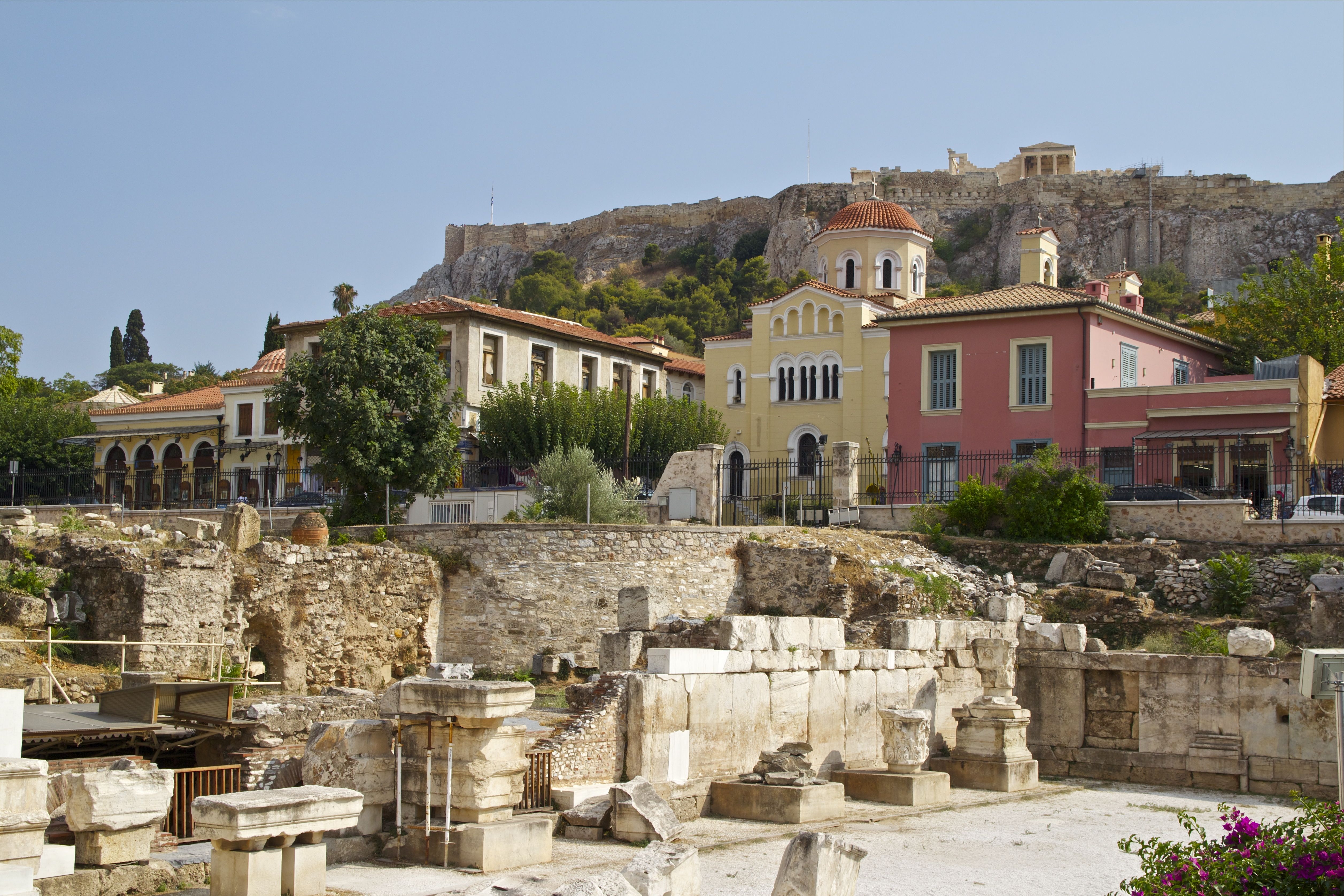
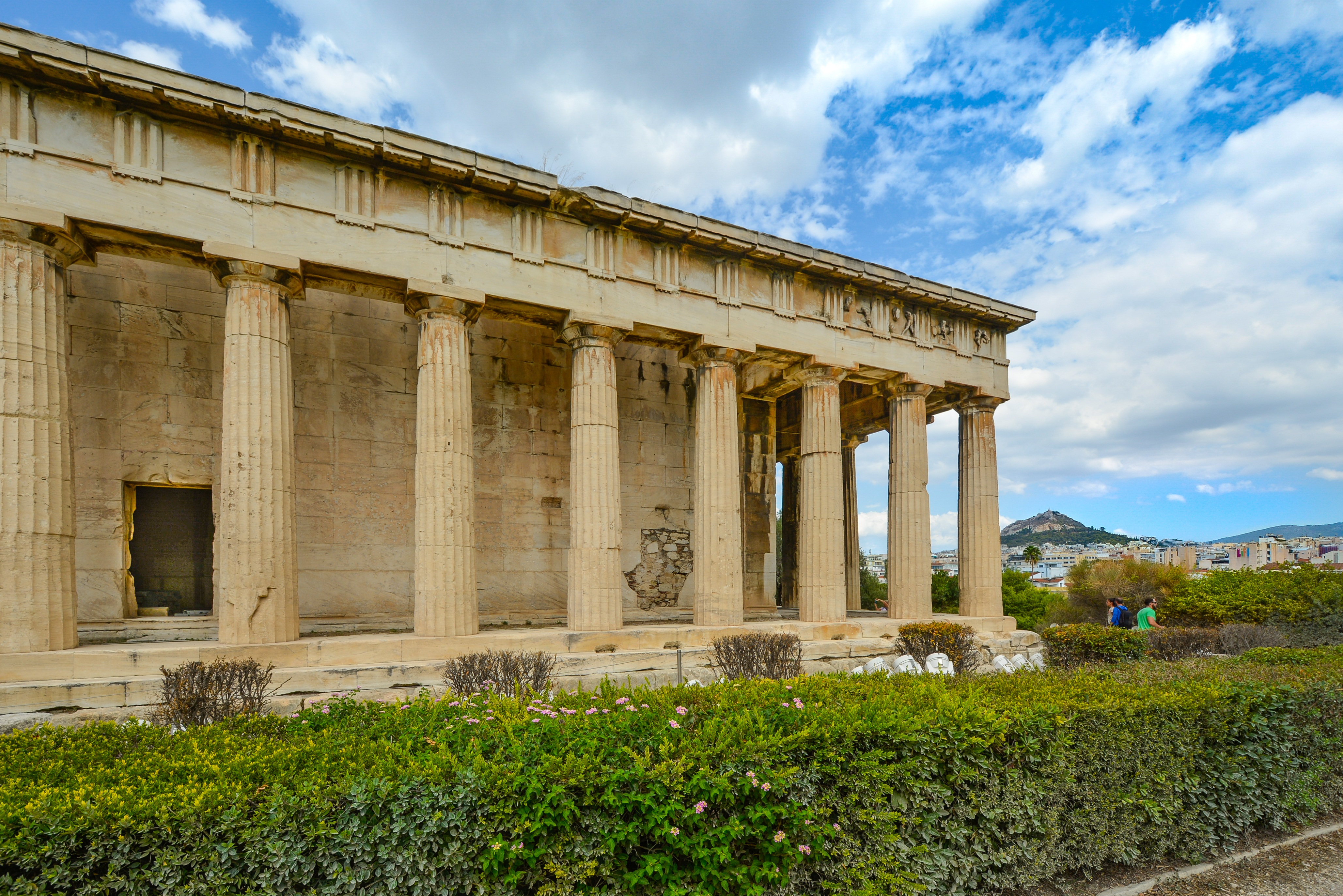
About Piraeus
It's no wonder that all roads lead to the fascinating and maddening metropolis of Athens. Lift your eyes 200 feet above the city to the Parthenon, its honey-color marble columns rising from a massive limestone base, and you behold architectural perfection that has not been surpassed in 2,500 years. But, today, this shrine of classical form dominates a 21st-century boomtown. To experience Athens—Athína in Greek—fully is to understand the essence of Greece: ancient monuments surviving in a sea of cement, startling beauty amid the squalor, tradition juxtaposed with modernity. Locals depend on humor and flexibility to deal with the chaos; you should do the same. The rewards are immense. Although Athens covers a huge area, the major landmarks of the ancient Greek, Roman, and Byzantine periods are close to the modern city center. You can easily walk from the Acropolis to many other key sites, taking time to browse in shops and relax in cafés and tavernas along the way. From many quarters of the city you can glimpse "the glory that was Greece" in the form of the Acropolis looming above the horizon, but only by actually climbing that rocky precipice can you feel the impact of the ancient settlement. The Acropolis and Filopappou, two craggy hills sitting side by side; the ancient Agora (marketplace); and Kerameikos, the first cemetery, form the core of ancient and Roman Athens. Along the Unification of Archaeological Sites promenade, you can follow stone-paved, tree-lined walkways from site to site, undisturbed by traffic. Cars have also been banned or reduced in other streets in the historical center. In the National Archaeological Museum, vast numbers of artifacts illustrate the many millennia of Greek civilization; smaller museums such as the Goulandris Museum of Cycladic Art Museum and the Byzantine and Christian Museum illuminate the history of particular regions or periods. Athens may seem like one huge city, but it is really a conglomeration of neighborhoods with distinctive characters. The Eastern influences that prevailed during the 400-year rule of the Ottoman Empire are still evident in Monastiraki, the bazaar area near the foot of the Acropolis. On the northern slope of the Acropolis, stroll through Plaka (if possible by moonlight), an area of tranquil streets lined with renovated mansions, to get the flavor of the 19th-century's gracious lifestyle. The narrow lanes of Anafiotika, a section of Plaka, thread past tiny churches and small, color-washed houses with wooden upper stories, recalling a Cycladic island village. In this maze of winding streets, vestiges of the older city are everywhere: crumbling stairways lined with festive tavernas; dank cellars filled with wine vats; occasionally a court or diminutive garden, enclosed within high walls and filled with magnolia trees and the flaming trumpet-shaped flowers of hibiscus bushes. Formerly run-down old quarters, such as Thission, Gazi and Psirri, popular nightlife areas filled with bars and mezedopoleia (similar to tapas bars), are now in the process of gentrification, although they still retain much of their original charm, as does the colorful produce and meat market on Athinas. The area around Syntagma Square, the tourist hub, and Omonia Square, the commercial heart of the city about 1 km (½ mi) northwest, is distinctly European, having been designed by the court architects of King Otho, a Bavarian, in the 19th century. The chic shops and bistros of ritzy Kolonaki nestle at the foot of Mt. Lycabettus, Athens's highest hill (909 feet). Each of Athens's outlying suburbs has a distinctive character: in the north is wealthy, tree-lined Kifissia, once a summer resort for aristocratic Athenians, and in the south and southeast lie Glyfada, Voula, and Vouliagmeni, with their sandy beaches, seaside bars, and lively summer nightlife. Just beyond the city's southern fringes is Piraeus, a bustling port city of waterside fish tavernas and Saronic Gulf views.







About Piraeus
It's no wonder that all roads lead to the fascinating and maddening metropolis of Athens. Lift your eyes 200 feet above the city to the Parthenon, its honey-color marble columns rising from a massive limestone base, and you behold architectural perfection that has not been surpassed in 2,500 years. But, today, this shrine of classical form dominates a 21st-century boomtown. To experience Athens—Athína in Greek—fully is to understand the essence of Greece: ancient monuments surviving in a sea of cement, startling beauty amid the squalor, tradition juxtaposed with modernity. Locals depend on humor and flexibility to deal with the chaos; you should do the same. The rewards are immense. Although Athens covers a huge area, the major landmarks of the ancient Greek, Roman, and Byzantine periods are close to the modern city center. You can easily walk from the Acropolis to many other key sites, taking time to browse in shops and relax in cafés and tavernas along the way. From many quarters of the city you can glimpse "the glory that was Greece" in the form of the Acropolis looming above the horizon, but only by actually climbing that rocky precipice can you feel the impact of the ancient settlement. The Acropolis and Filopappou, two craggy hills sitting side by side; the ancient Agora (marketplace); and Kerameikos, the first cemetery, form the core of ancient and Roman Athens. Along the Unification of Archaeological Sites promenade, you can follow stone-paved, tree-lined walkways from site to site, undisturbed by traffic. Cars have also been banned or reduced in other streets in the historical center. In the National Archaeological Museum, vast numbers of artifacts illustrate the many millennia of Greek civilization; smaller museums such as the Goulandris Museum of Cycladic Art Museum and the Byzantine and Christian Museum illuminate the history of particular regions or periods. Athens may seem like one huge city, but it is really a conglomeration of neighborhoods with distinctive characters. The Eastern influences that prevailed during the 400-year rule of the Ottoman Empire are still evident in Monastiraki, the bazaar area near the foot of the Acropolis. On the northern slope of the Acropolis, stroll through Plaka (if possible by moonlight), an area of tranquil streets lined with renovated mansions, to get the flavor of the 19th-century's gracious lifestyle. The narrow lanes of Anafiotika, a section of Plaka, thread past tiny churches and small, color-washed houses with wooden upper stories, recalling a Cycladic island village. In this maze of winding streets, vestiges of the older city are everywhere: crumbling stairways lined with festive tavernas; dank cellars filled with wine vats; occasionally a court or diminutive garden, enclosed within high walls and filled with magnolia trees and the flaming trumpet-shaped flowers of hibiscus bushes. Formerly run-down old quarters, such as Thission, Gazi and Psirri, popular nightlife areas filled with bars and mezedopoleia (similar to tapas bars), are now in the process of gentrification, although they still retain much of their original charm, as does the colorful produce and meat market on Athinas. The area around Syntagma Square, the tourist hub, and Omonia Square, the commercial heart of the city about 1 km (½ mi) northwest, is distinctly European, having been designed by the court architects of King Otho, a Bavarian, in the 19th century. The chic shops and bistros of ritzy Kolonaki nestle at the foot of Mt. Lycabettus, Athens's highest hill (909 feet). Each of Athens's outlying suburbs has a distinctive character: in the north is wealthy, tree-lined Kifissia, once a summer resort for aristocratic Athenians, and in the south and southeast lie Glyfada, Voula, and Vouliagmeni, with their sandy beaches, seaside bars, and lively summer nightlife. Just beyond the city's southern fringes is Piraeus, a bustling port city of waterside fish tavernas and Saronic Gulf views.







About Heraklion (Iraklion), Crete
Having been controlled by Arabic, Venetian and Ottoman empires over the years - it's no surprise that Heraklion is a diverse patchwork of exotic cultures and historical treasures. Celebrated as the birthplace of the Spanish Renaissance artist, El Greco, you can visit to explore the storied ruins of the Minoan empire's capital, and unearth the rich cultural treasures that Crete’s bustling modern capital has to offer.
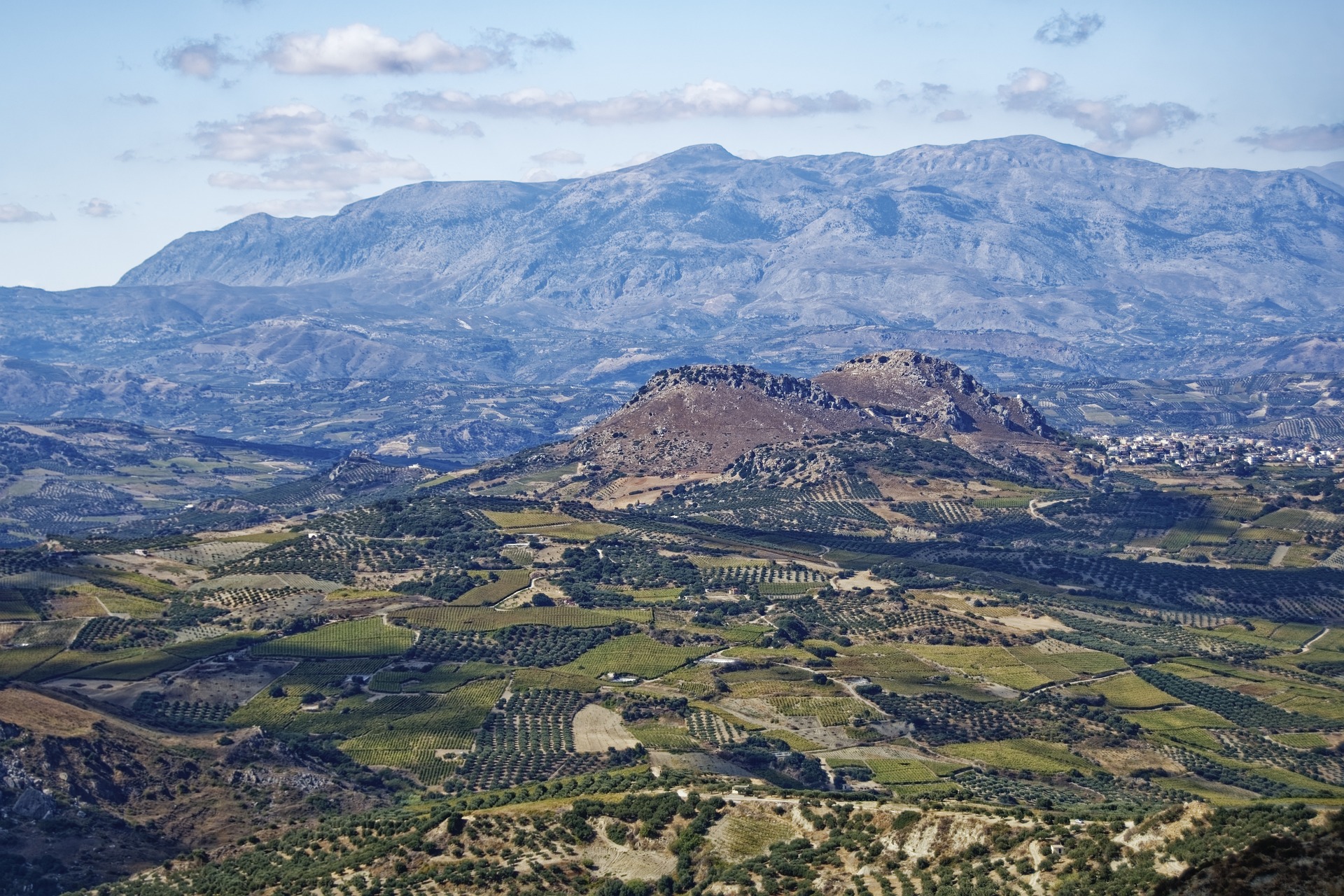
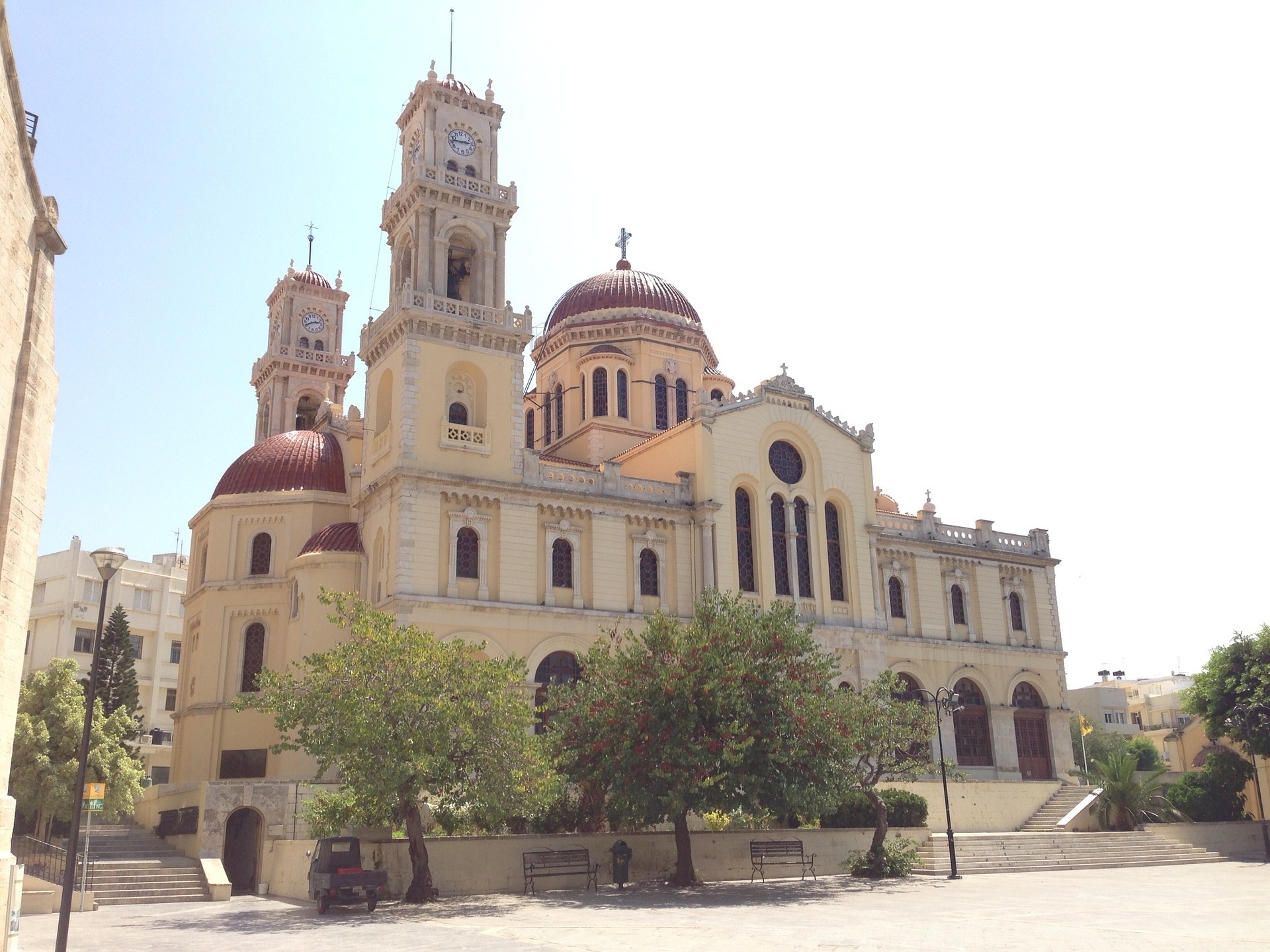
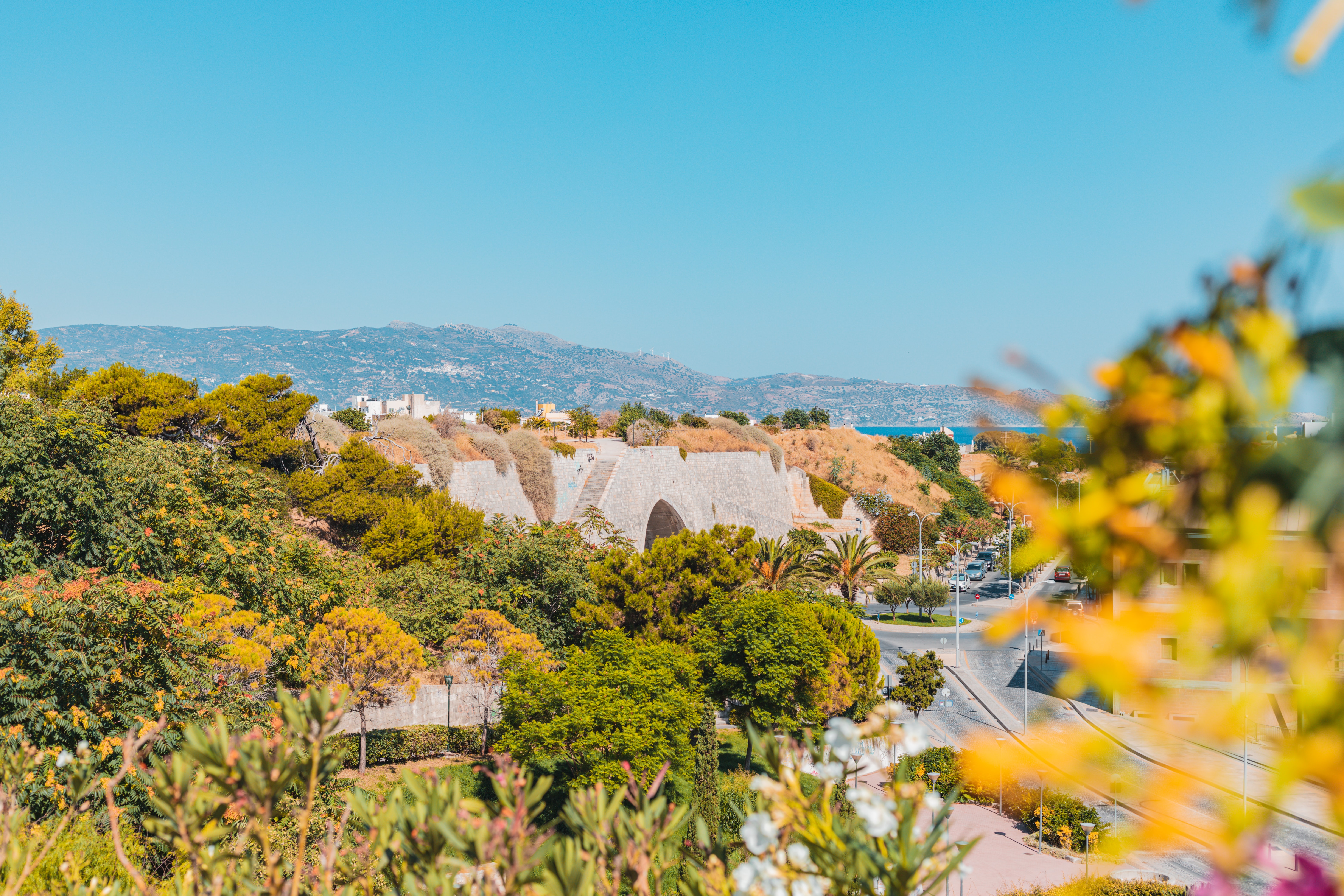
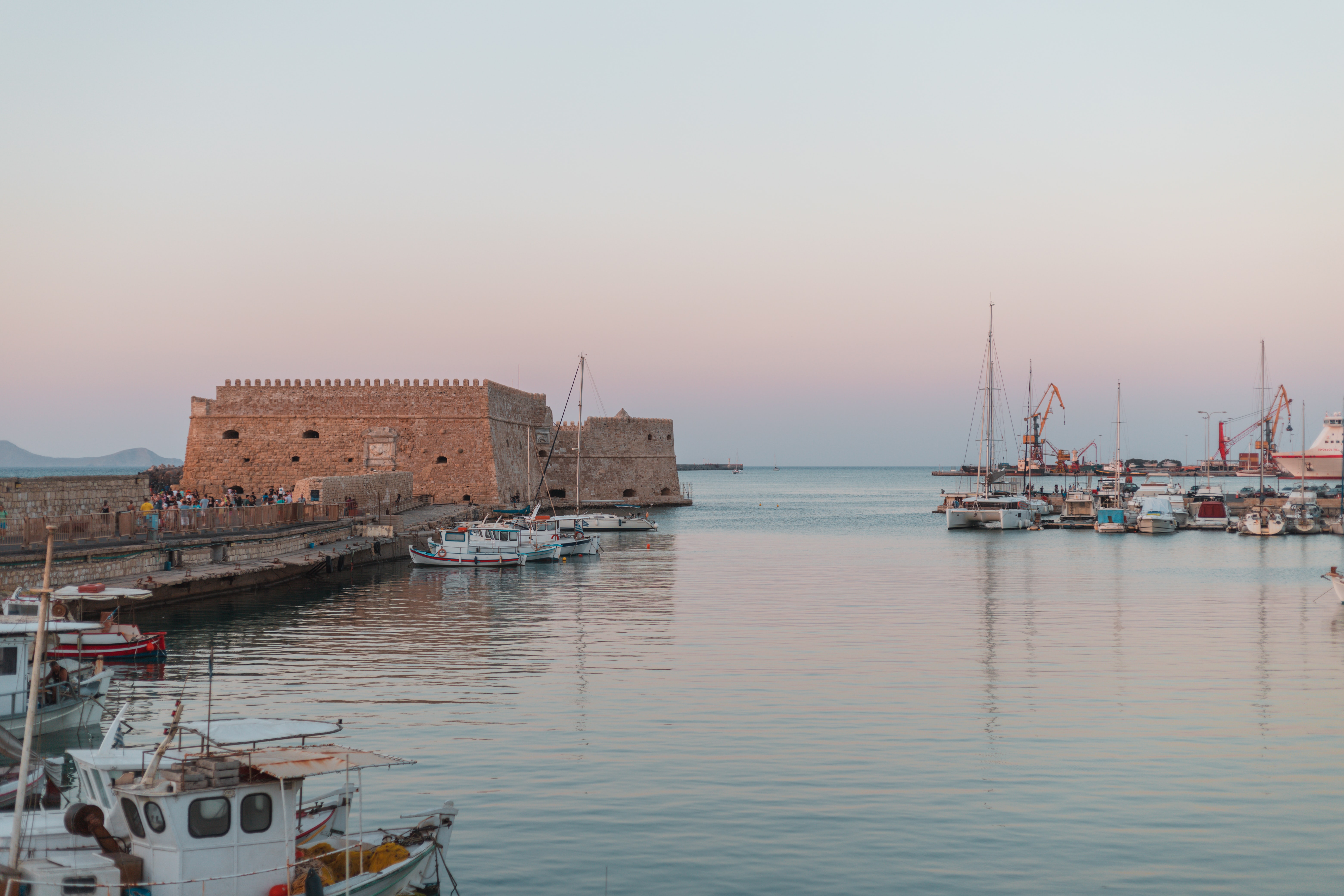

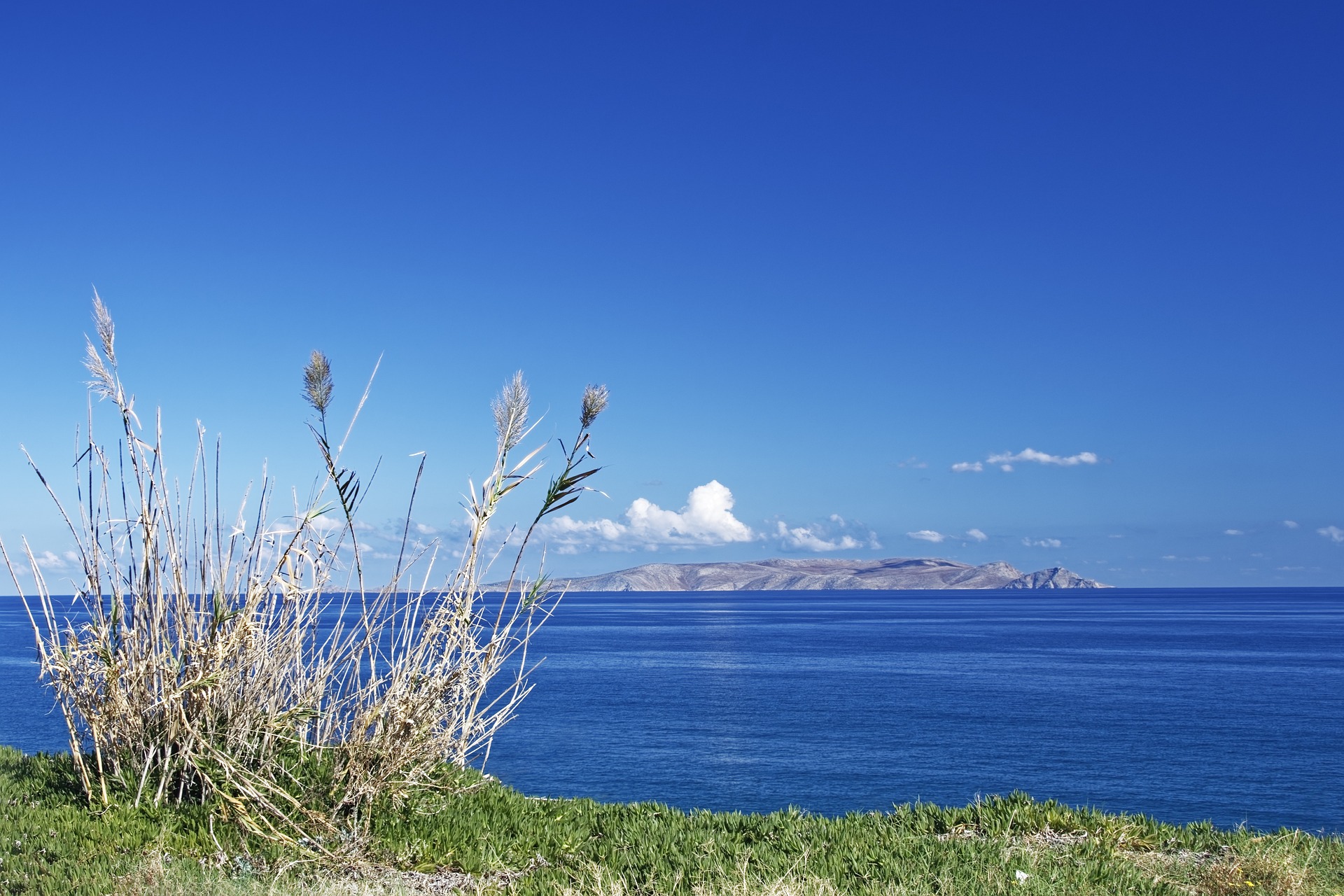
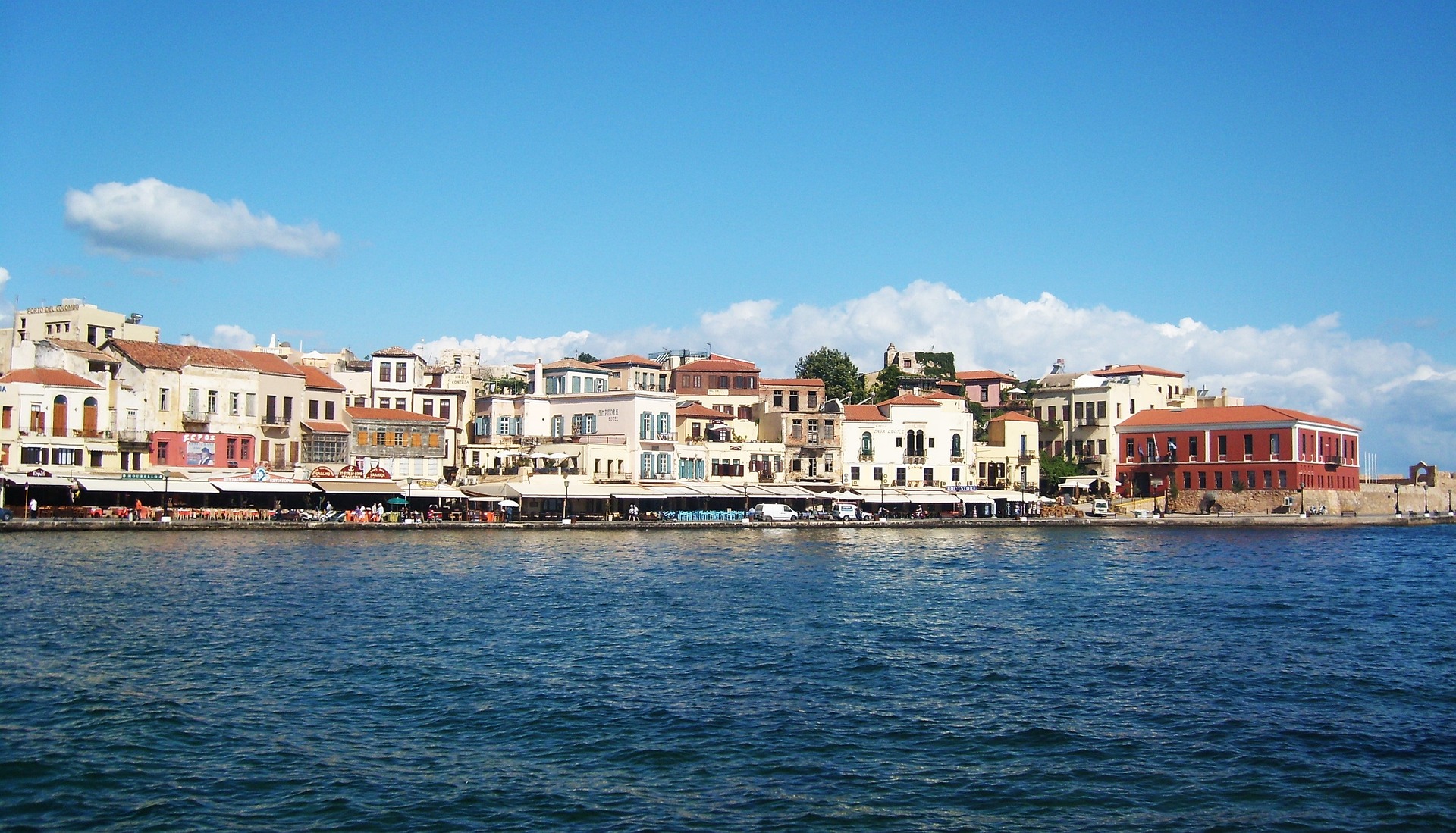
About Rhodes
Early travelers described Rhodes as a town of two parts: a castle or high town (Collachium) and a lower city. Today Rhodes town—sometimes referred to as Ródos town—is still a city of two parts: the Old Town, a UNESCO World Heritage site that incorporates the high town and lower city, and the modern metropolis, or New Town, spreading away from the walls that encircle the Old Town. The narrow streets of the Old Town are for the most part closed to cars and are lined with Orthodox and Catholic churches, Turkish houses (some of which follow the ancient orthogonal plan), and medieval public buildings with exterior staircases and facades elegantly constructed of well-cut limestone from Lindos. Careful reconstruction in recent years has enhanced the harmonious effect.
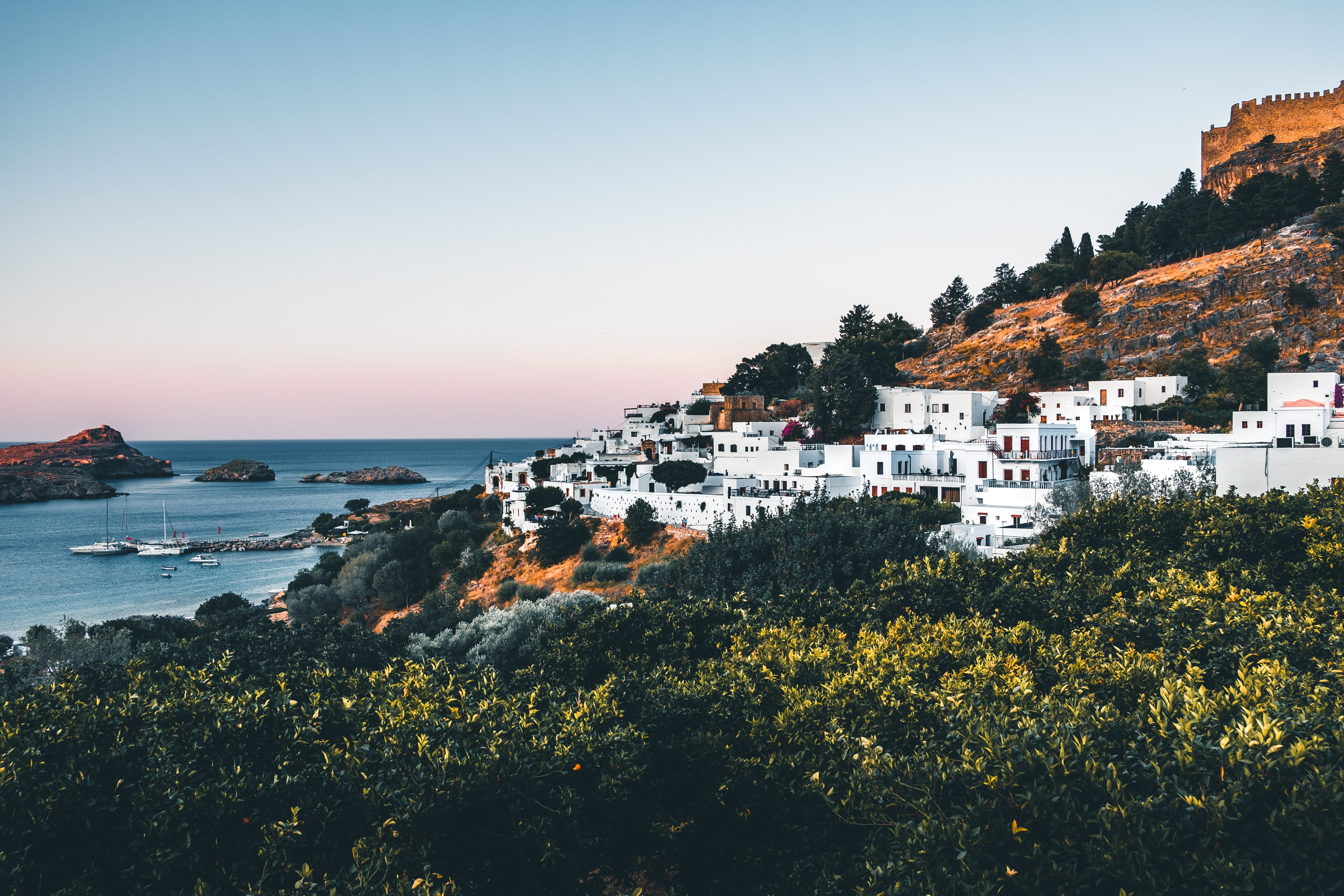
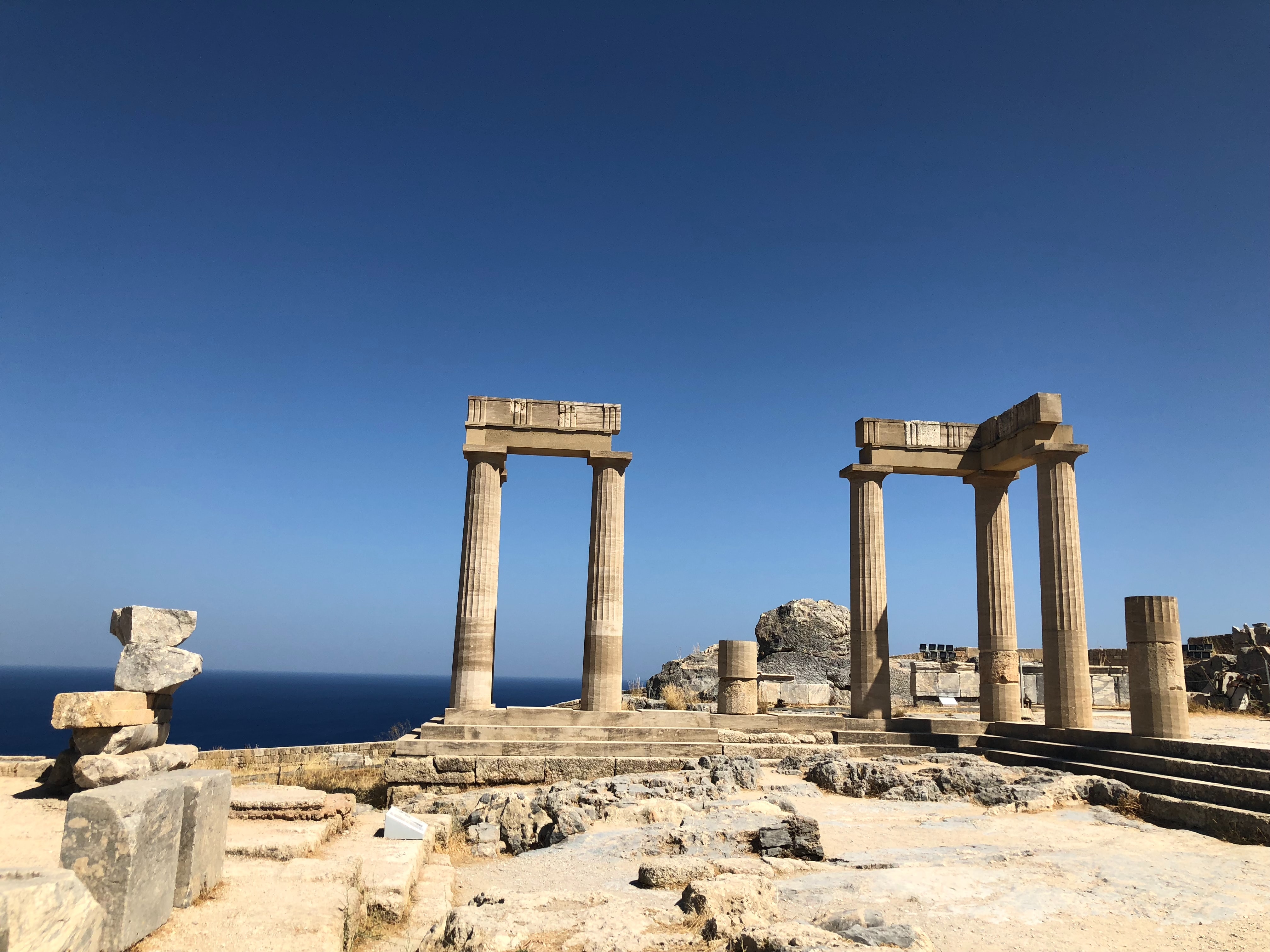
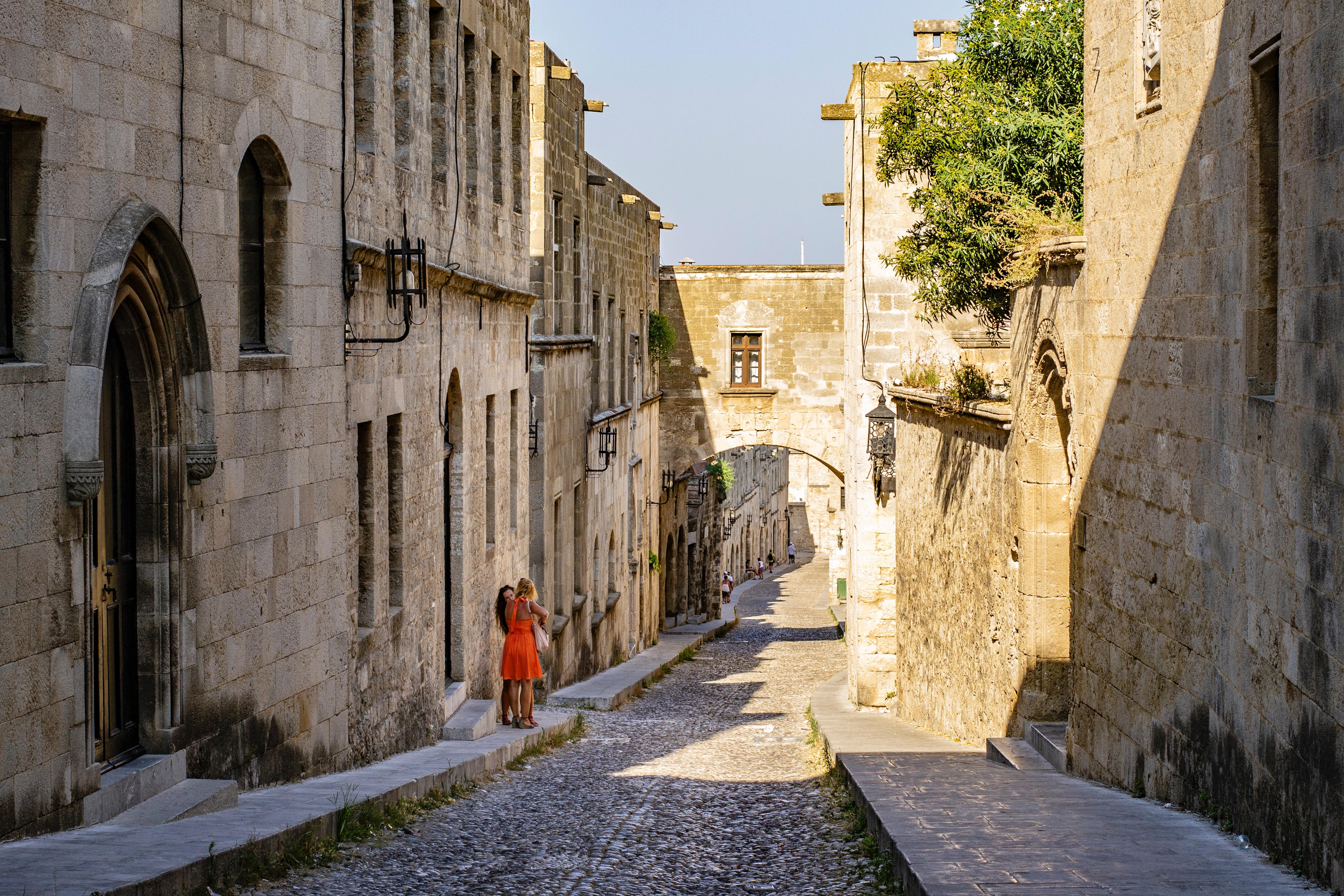
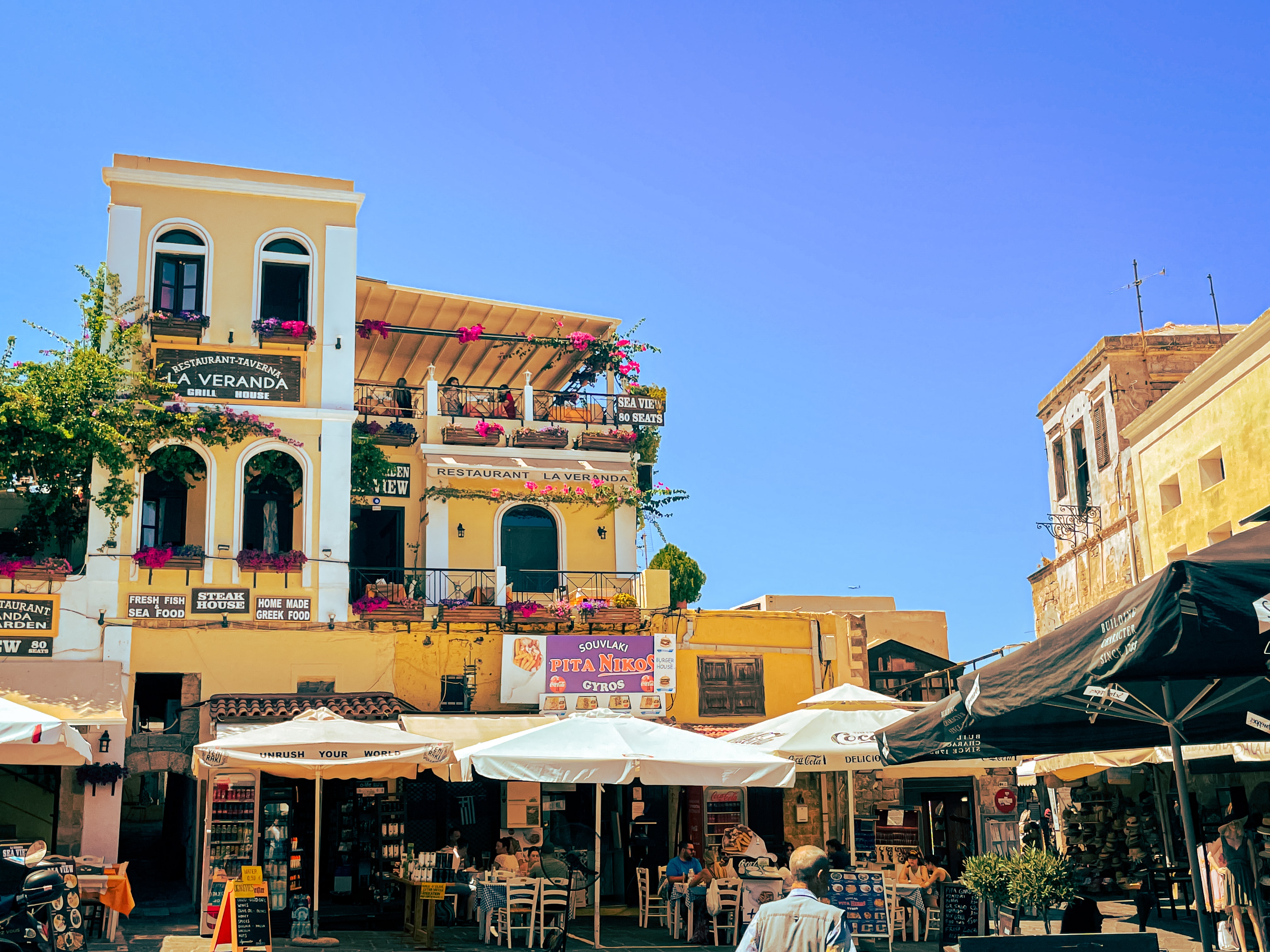
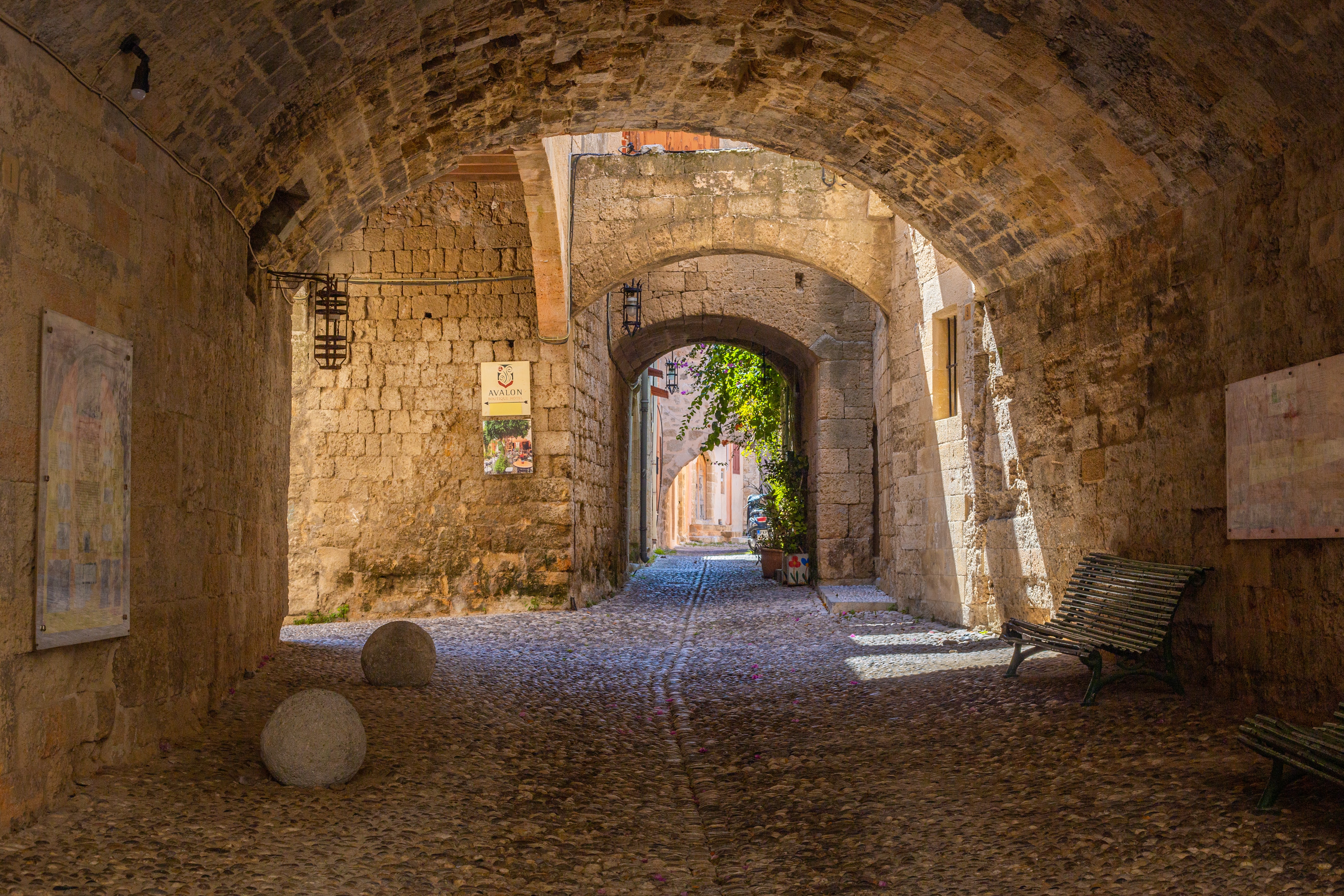
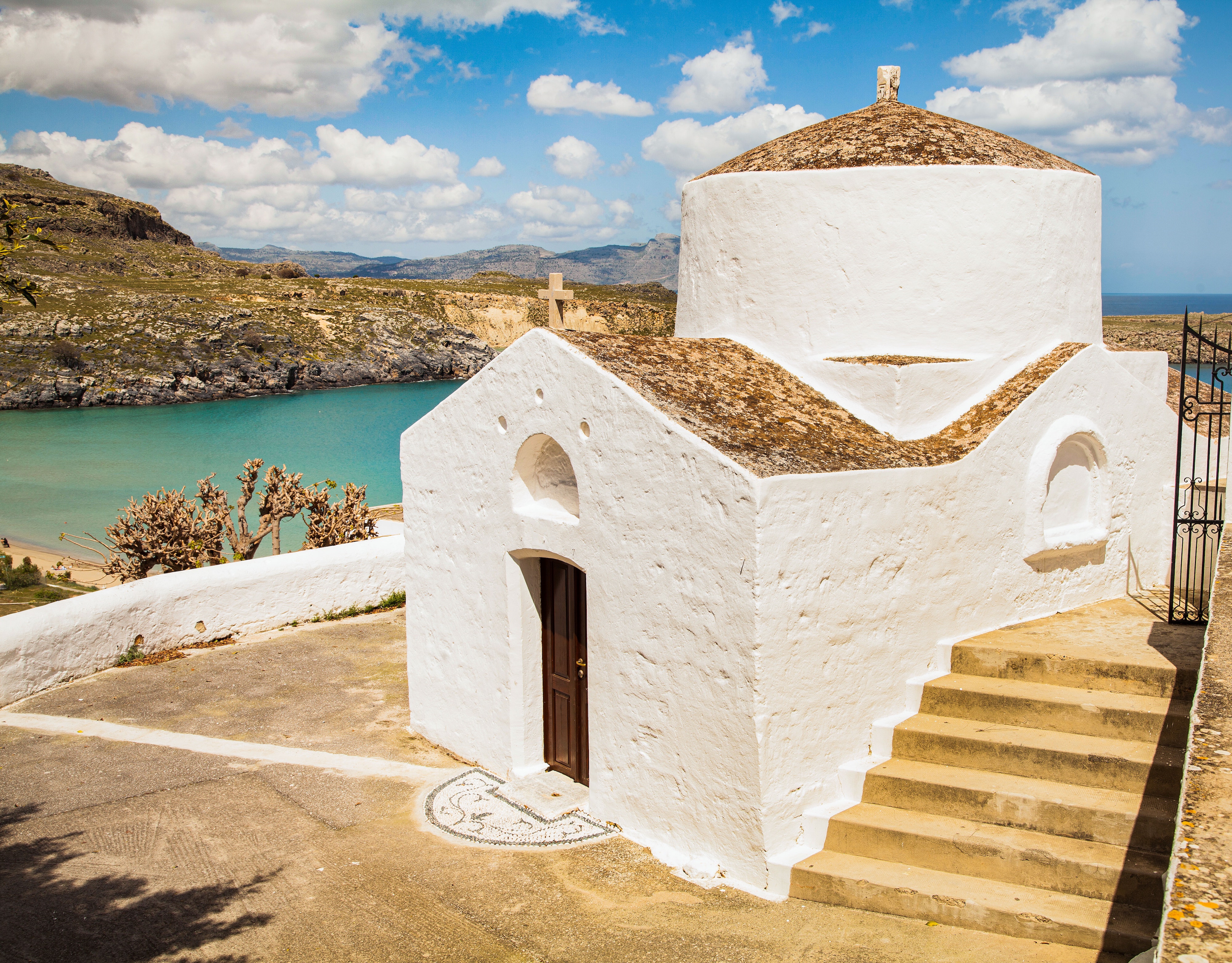
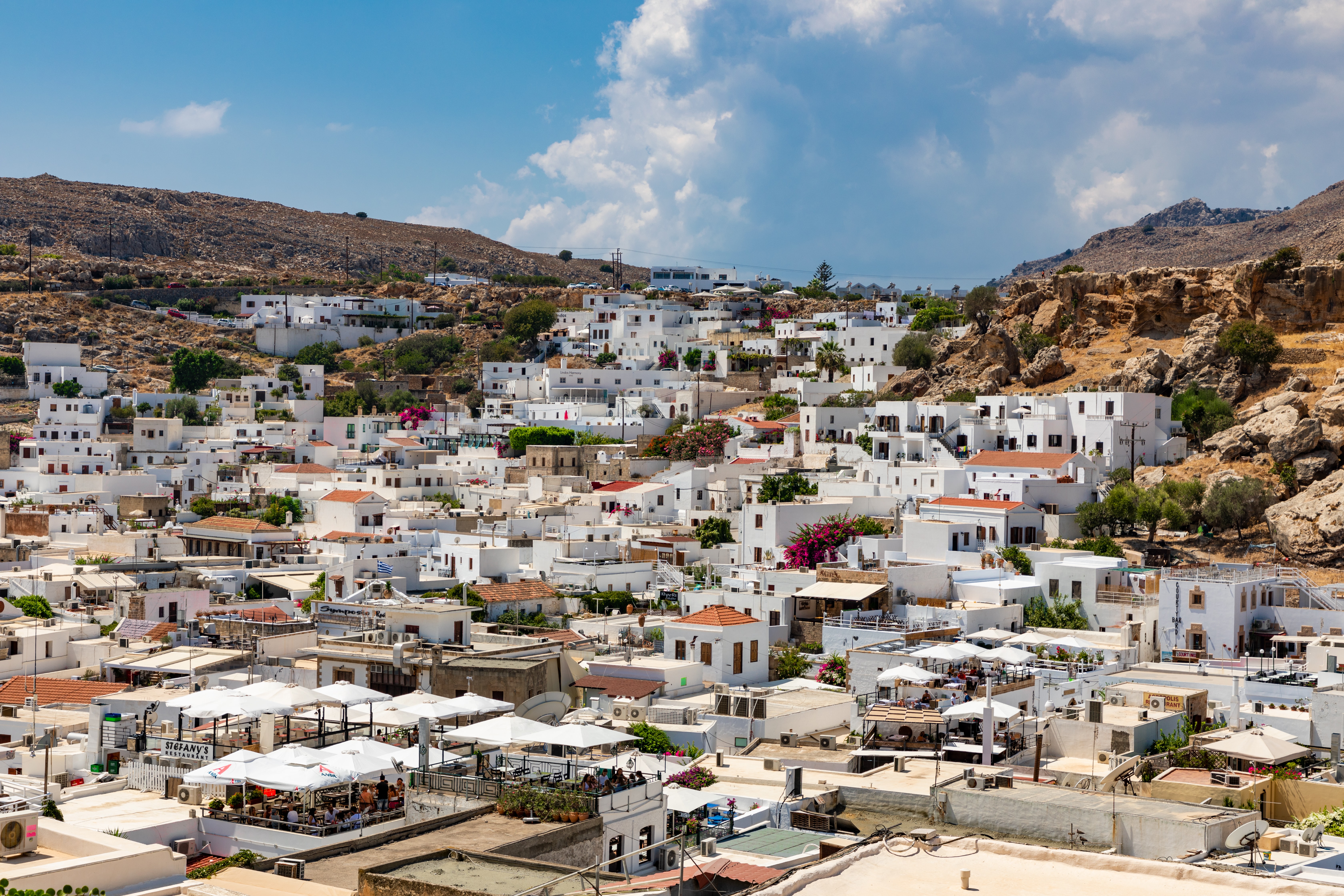
About Kusadasi
Whilst the busy resort town of Kusadasi offers much in the way of shopping and dining – not to mention a flourishing beach life scene, the real jewel here is Ephesus and the stunning ruined city that really take centre stage. With only 20% of the classical ruins having been excavated, this archaeological wonder has already gained the status as Europe’s most complete classical metropolis. And a metropolis it really is; built in the 10th century BC this UNESCO World Heritage site is nothing short of spectacular. Although regrettably very little remains of the Temple of Artemis (one of the seven wonders of the ancient world), the superb Library of Celsus’ façade is practically intact and it is one of life’s great joys to attend an evening performance in the illuminated ruins once all the tourists have left. The history of the city is fascinating and multi-layered and it is well worth reading up on this beforehand if a visit is planned. Another point of interest for historians would be the house of the Virgin Mary, located on the romantically named Mount Nightingale and just nine kilometres away from Ephesus proper. Legend has it that Mary (along with St. John) spent her final years here, secluded from the rest of the population, spreading Christianity. An edifying experience, even for non-believers. For the less historical minded amongst you, Kusadasi offers plenty in the way of activities. After a stroll through the town, jump in a taxi to Ladies’ Beach (men are allowed), sample a Turkish kebap on one of the many beachfront restaurants and enjoy the clement weather. If you do want to venture further afield, then the crystal clear beaches of Guzelcamli (or the Millipark), the cave of Zeus and the white scalloped natural pools at Pamukkale, known as Cleopatra’s pools, are definitely worth a visit.





About Çanakkale
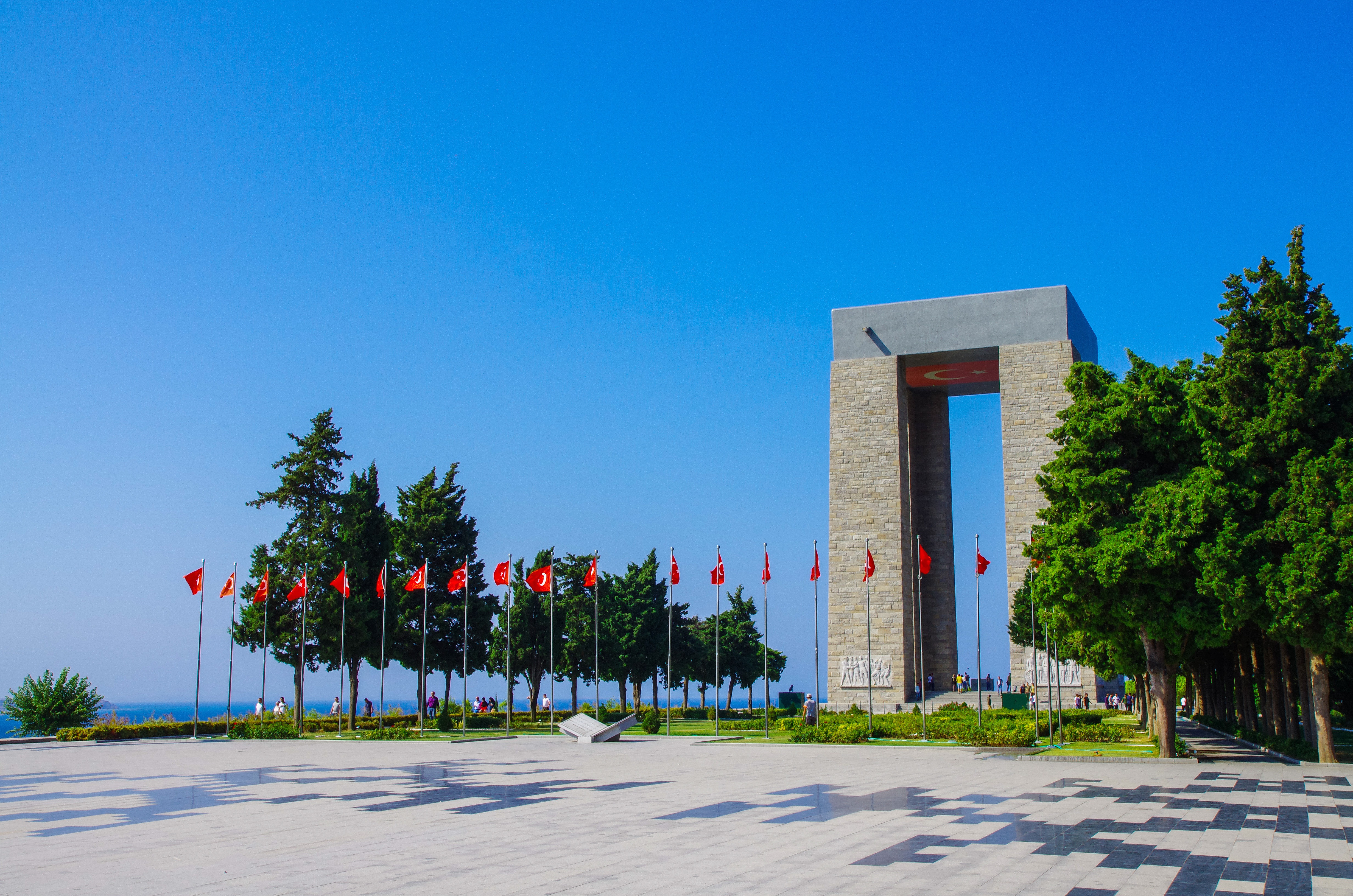
About Istanbul
The only city in the world that can lay claim to straddling two continents, Istanbul—once known as Constantinople, capital of the Byzantine and then the Ottoman Empire—has for centuries been a bustling metropolis with one foot in Europe and the other in Asia. Istanbul embraces this enviable position with both a certain chaos and inventiveness, ever evolving as one of the world’s most cosmopolitan crossroads. It’s often said that Istanbul is the meeting point of East and West, but visitors to this city built over the former capital of two great empires are likely to be just as impressed by the juxtaposition of old and new. Office towers creep up behind historic palaces, women in chic designer outfits pass others wearing long skirts and head coverings, peddlers’ pushcarts vie with battered old Fiats and shiny BMWs for dominance of the noisy, narrow streets, and the Grand Bazaar competes with modern shopping malls. At dawn, when the muezzin's call to prayer resounds from ancient minarets, there are inevitably a few hearty revelers still making their way home from nightclubs and bars. Most visitors to this sprawling city of more than 14 million will first set foot in the relatively compact Old City, where the legacy of the Byzantine and Ottoman empires can be seen in monumental works of architecture like the brilliant Aya Sofya and the beautifully proportioned mosques built by the great architect Sinan. Though it would be easy to spend days, if not weeks, exploring the wealth of attractions in the historical peninsula, visitors should make sure also to venture elsewhere in order to experience the vibrancy of contemporary Istanbul. With a lively nightlife propelled by its young population and an exciting arts scene that’s increasingly on the international radar—thanks in part to its stint as the European Capital of Culture in 2010—Istanbul is truly a city that never sleeps. It’s also a place where visitors will feel welcome: Istanbul may be on the Bosphorus, but at heart it’s a Mediterranean city, whose friendly inhabitants are effusively social and eager to share what they love most about it.
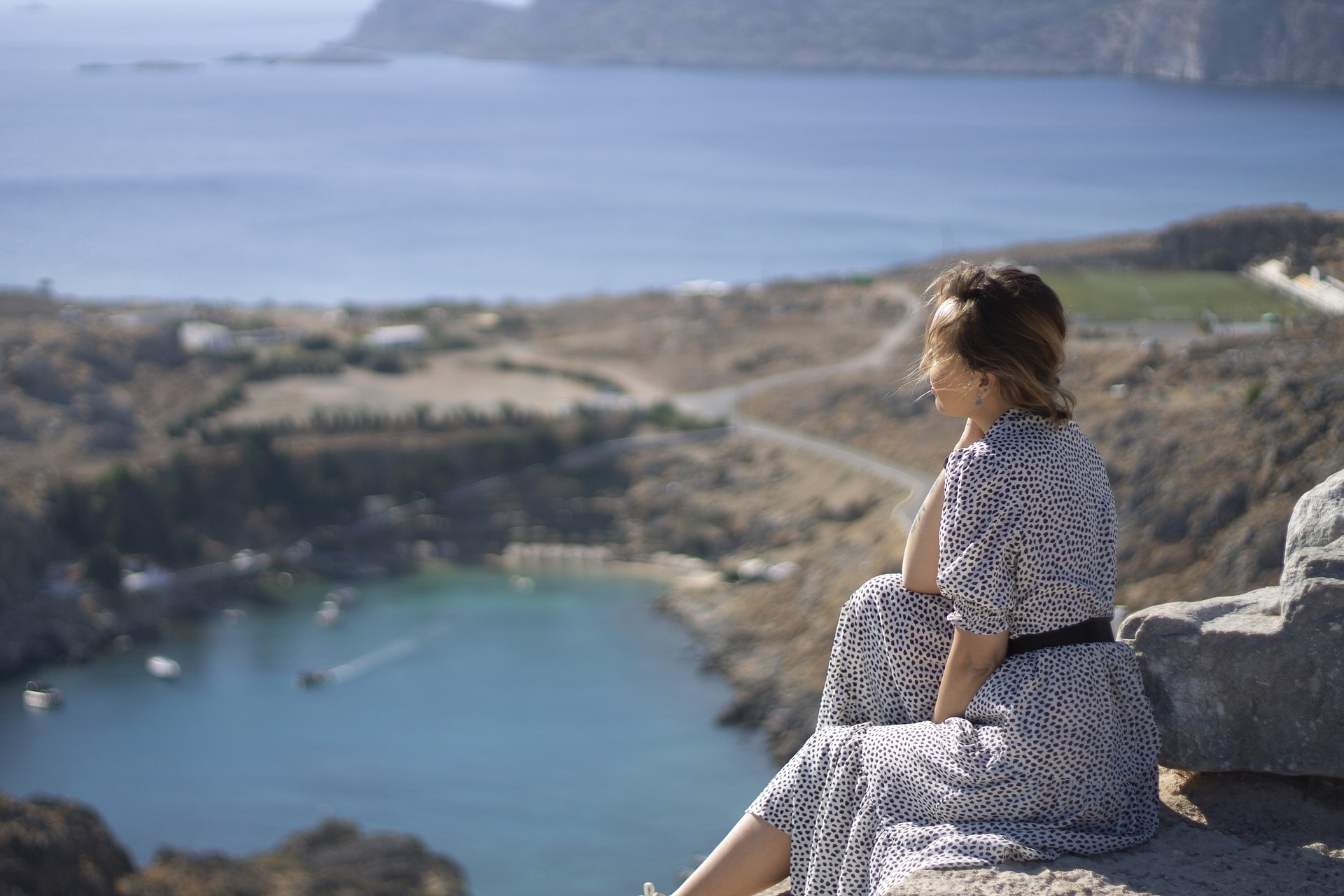

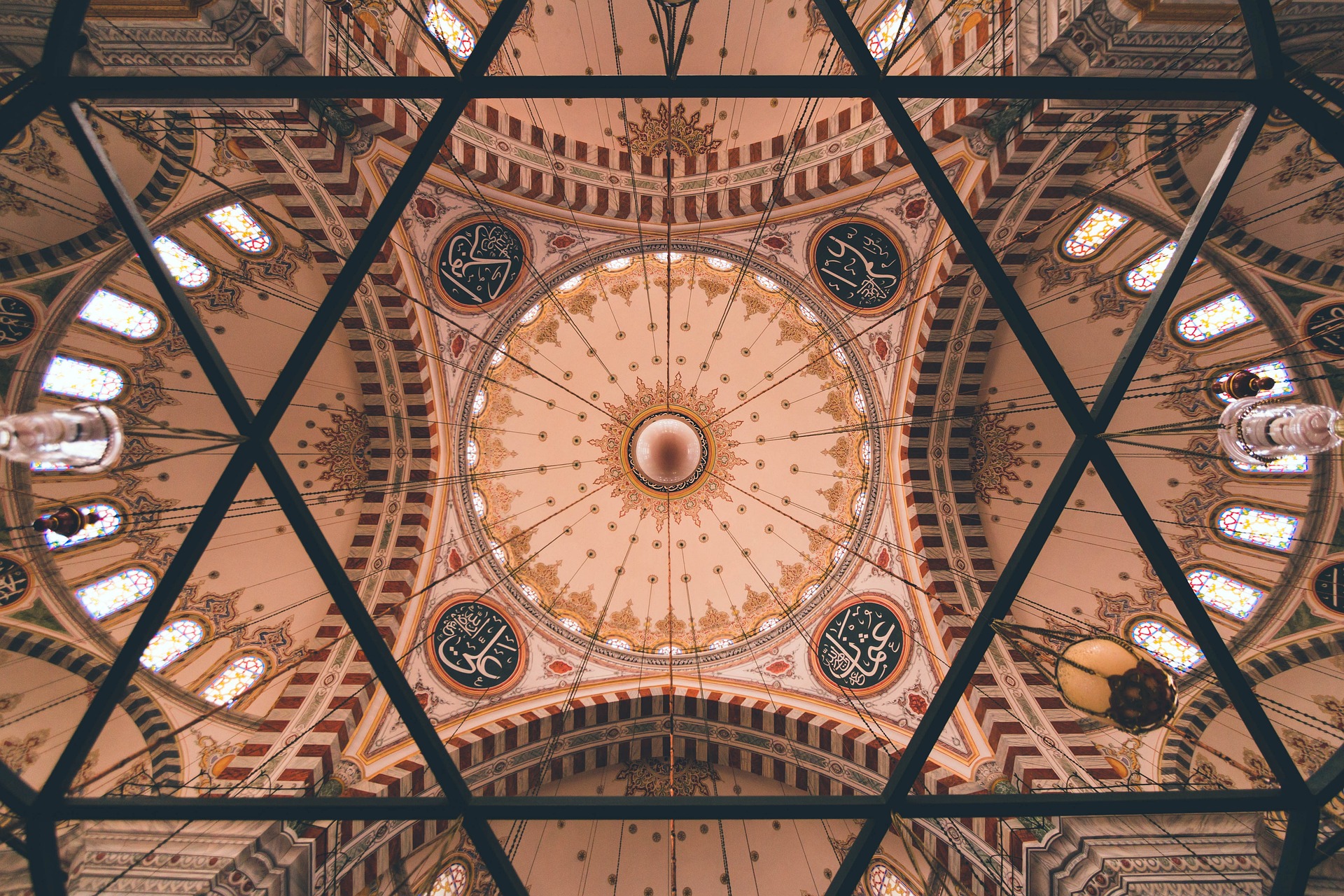


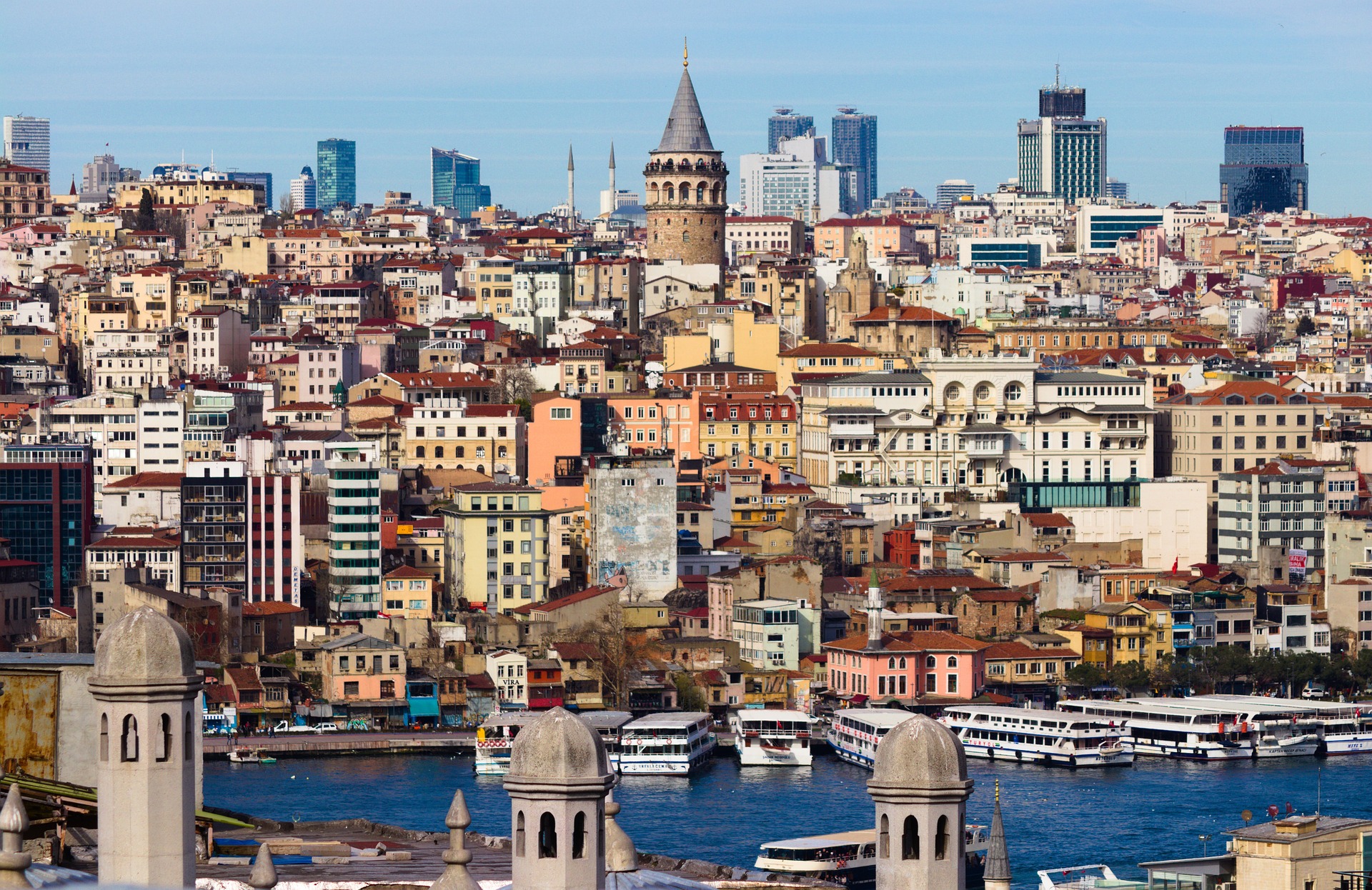
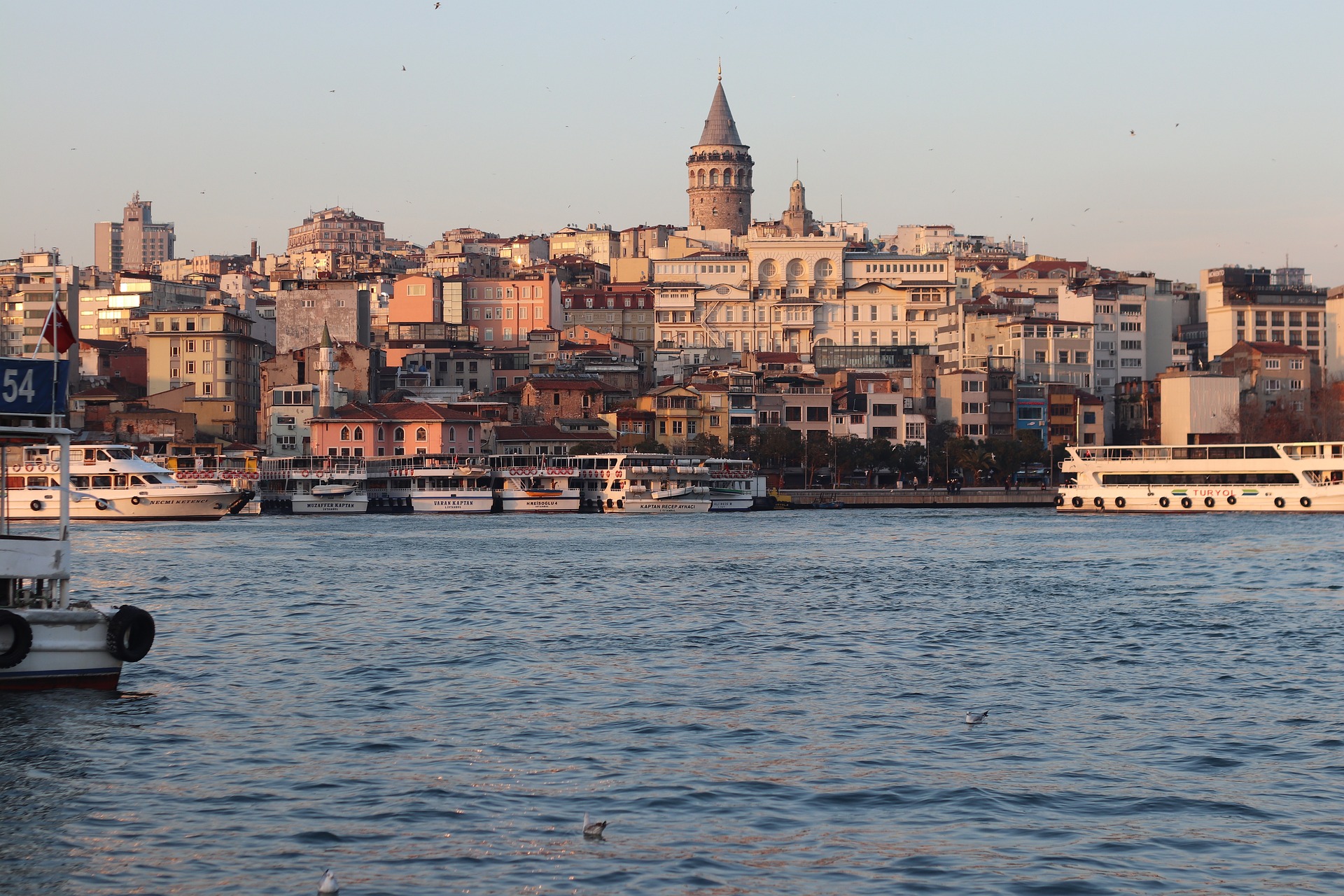
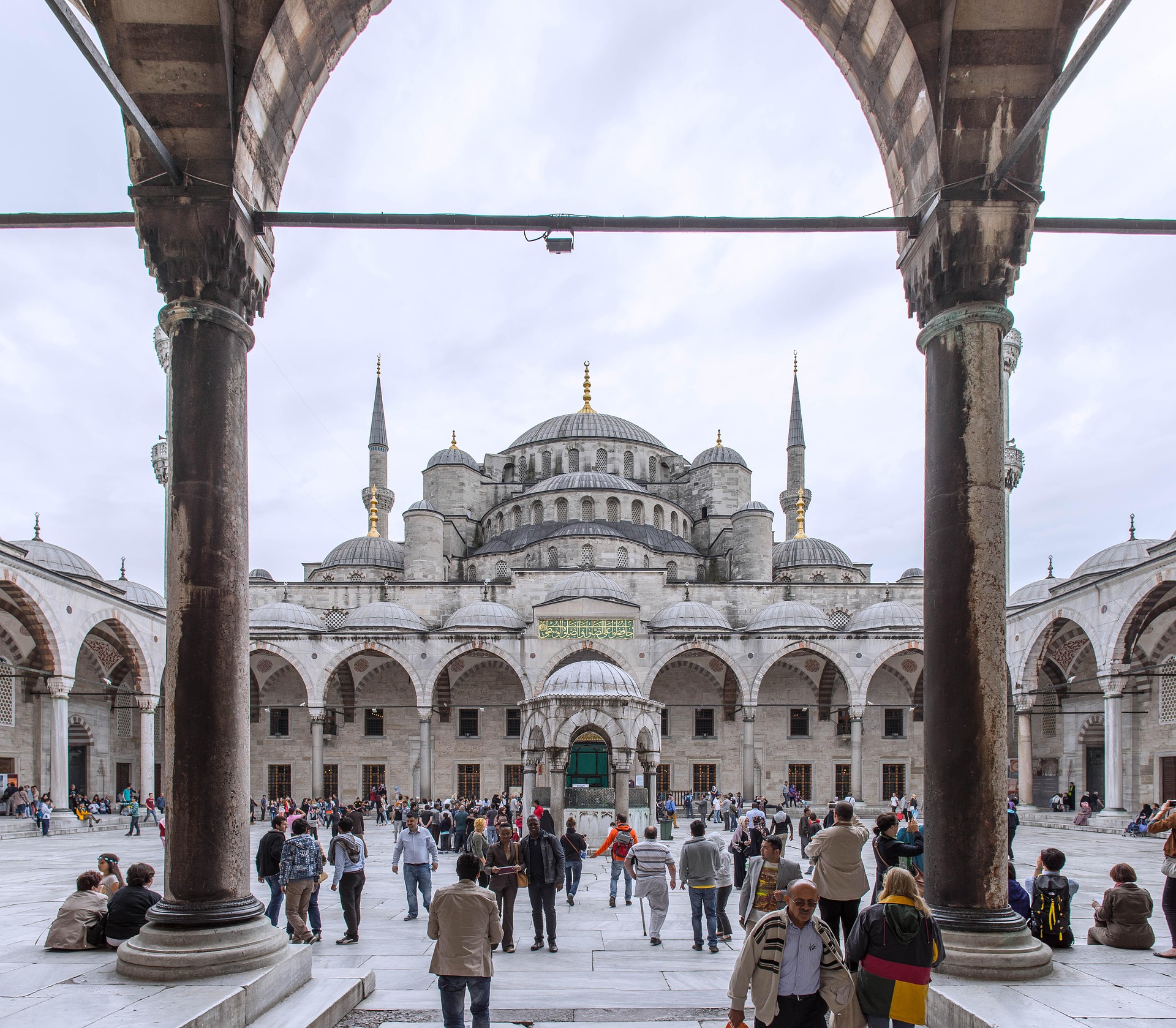
About Istanbul
The only city in the world that can lay claim to straddling two continents, Istanbul—once known as Constantinople, capital of the Byzantine and then the Ottoman Empire—has for centuries been a bustling metropolis with one foot in Europe and the other in Asia. Istanbul embraces this enviable position with both a certain chaos and inventiveness, ever evolving as one of the world’s most cosmopolitan crossroads. It’s often said that Istanbul is the meeting point of East and West, but visitors to this city built over the former capital of two great empires are likely to be just as impressed by the juxtaposition of old and new. Office towers creep up behind historic palaces, women in chic designer outfits pass others wearing long skirts and head coverings, peddlers’ pushcarts vie with battered old Fiats and shiny BMWs for dominance of the noisy, narrow streets, and the Grand Bazaar competes with modern shopping malls. At dawn, when the muezzin's call to prayer resounds from ancient minarets, there are inevitably a few hearty revelers still making their way home from nightclubs and bars. Most visitors to this sprawling city of more than 14 million will first set foot in the relatively compact Old City, where the legacy of the Byzantine and Ottoman empires can be seen in monumental works of architecture like the brilliant Aya Sofya and the beautifully proportioned mosques built by the great architect Sinan. Though it would be easy to spend days, if not weeks, exploring the wealth of attractions in the historical peninsula, visitors should make sure also to venture elsewhere in order to experience the vibrancy of contemporary Istanbul. With a lively nightlife propelled by its young population and an exciting arts scene that’s increasingly on the international radar—thanks in part to its stint as the European Capital of Culture in 2010—Istanbul is truly a city that never sleeps. It’s also a place where visitors will feel welcome: Istanbul may be on the Bosphorus, but at heart it’s a Mediterranean city, whose friendly inhabitants are effusively social and eager to share what they love most about it.








- 11:00 AM embarkation
- 11:00 AM priority stateroom access
- First opportunity to reserve shore excursions: 107 days prior to departure
- 4 guaranteed priority reservations at each alternative restaurant: 100 days prior to departure
- First priority booking of spa treatments: 100 days prior to departure
- King-size Viking Explorer Bed with luxury linens & pillows
- Free Wi-Fi (connection speed may vary)
- Three 42 flat-screen, interactive LCD TVs with intuitive remote & complimentary Movies On Demand
- 110/220 volt outlets & USB ports
- Mini-bar with alcoholic beverages, soft drinks, water & upgraded snacks (replenished once daily); security safe; hair dryer
- Direct-dial satellite phone & cell service
- Large master bathroom featuring a spacious glass-enclosed shower, double-sink vanity, heated bathroom floor & anti-fog mirror, plus two guest bathrooms
- Premium Freyja® toiletries; plush robes & slippers
- Purified water refilled daily
- Stateroom steward & twice-daily housekeeping
- 24-hour room service (including service from any restaurant during open hours)
- Spacious walk-in closet & drawers
- Complimentary laundry, dry cleaning, pressing & shoe shine services
- Welcome bottle of Veuve Clicquot champagne
- In-suite binoculars, coffee brewer & traditional Norwegian Marius-weave blanket
- Spacious, well-appointed living room
- Separate dining area that seats 6 guests
- Private library, wine & music collections curated by Chairman Torstein Hagen
- Ocean-view dry sauna
- Boardroom (seats 12) for business meetings & catered dinner parties, with first oceangoing vapor-light fireplace
- Pantry for room service & hosted events
- Complimentary shore excursion with private car & driver (up to 4 guests) in port city of your choice (valued at up to $800)
- Daily personalized tea or pre-dinner cocktail & canapés by request
- Dinner & guided tour with ship officers (subject to availability)
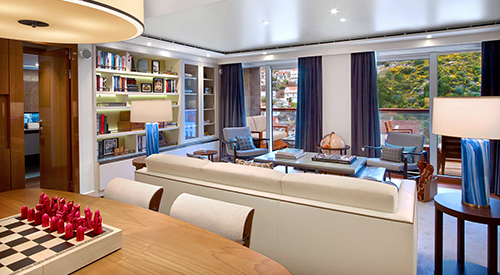
- 11:00 AM embarkation
- 11:00 AM priority stateroom access
- Priority shore excursion reservations: 97 days prior to departure
- 3 guaranteed priority reservations at each alternative restaurant: 90 days prior to departure
- Priority booking of spa treatments: 90 days prior to departure
- King-size Viking Explorer Bed with luxury linens & pillows
- Free Wi-Fi (connection speed may vary)
- Two 42" flat-screen, interactive LCD TVs with intuitive remote & complimentary Movies On Demand
- 110/220 volt outlets & USB ports
- Mini-bar with alcoholic beverages, soft drinks, water & snacks (replenished once daily); security safe; hair dryer
- Direct-dial satellite phone & cell service
- Large private bathroom with spacious glass-enclosed shower, double-sink vanity, heated bathroom floor & anti-fog mirror
- Premium Freyja® toiletries; plush robes & slippers
- Purified water refilled daily
- Stateroom steward & twice-daily housekeeping
- 24-hour room service
- Spacious closet & drawers
- Complimentary laundry, dry cleaning, pressing & shoe shine services
- Welcome bottle of champagne
- In-suite binoculars, coffee brewer & traditional Norwegian Marius-weave blanket
- Well-appointed living room & dining area that seats 4 guests
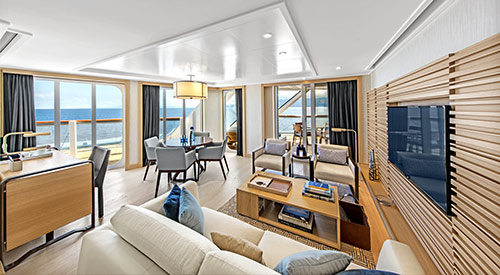
- 11:00 AM embarkation
- 11:00 AM priority stateroom access
- Priority shore excursion reservations: 87 days prior to departure
- 3 guaranteed priority reservations at each alternative restaurant: 80 days prior to departure
- Priority booking of spa treatments: 80 days prior to departure
- King-size Viking Explorer Bed with luxury linens & pillows
- Free Wi-Fi (connection speed may vary)
- Two 42" flat-screen, interactive LCD TVs with intuitive remote & complimentary Movies On Demand
- 110/220 volt outlets & USB ports
- Mini-bar with alcoholic beverages, soft drinks, water & snacks (replenished once daily); security safe; hair dryer
- Direct-dial satellite phone & cell service
- Large private bathroom with spacious glass-enclosed shower, double-sink vanity, heated bathroom floor & anti-fog mirror
- Premium Freyja® toiletries; plush robes & slippers
- Purified water refilled daily
- Stateroom steward & twice-daily housekeeping
- 24-hour room service
- Spacious closet & drawers
- Complimentary laundry, dry cleaning, pressing & shoe shine services
- Welcome bottle of champagne
- In-suite binoculars, coffee brewer & traditional Norwegian Marius-weave blanket
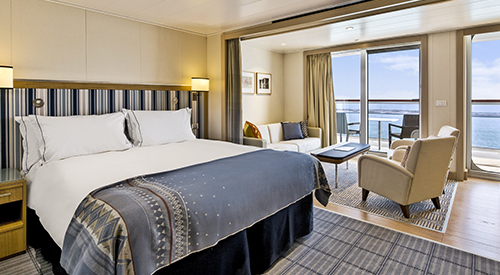
- 11:00 AM embarkation
- 1:00 PM stateroom access
- Priority shore excursion reservations: 77 days prior to departure
- 2 guaranteed priority reservations at each alternative restaurant: 70 days prior to departure
- Priority booking of spa treatments: 70 days prior to departure
- King-size Viking Explorer Bed with luxury linens & pillows
- Free Wi-Fi (connection speed may vary)
- 42" flat-screen, interactive LCD TV with intuitive remote & complimentary Movies On Demand
- 110/220 volt outlets & USB ports
- Mini-bar with alcoholic beverages, soft drinks, water & snacks (replenished once daily); security safe; hair dryer
- Direct-dial satellite phone & cell service
- Large private bathroom with spacious glass-enclosed shower, heated bathroom floor & anti-fog mirror
- Premium Freyja® toiletries; plush robes & slippers
- Purified water refilled daily
- Stateroom steward & twice-daily housekeeping
- 24-hour room service
- Spacious closet & drawers
- Complimentary pressing & shoe shine services
- Welcome bottle of champagne
- In-suite binoculars, coffee brewer & traditional Norwegian Marius-weave blanket
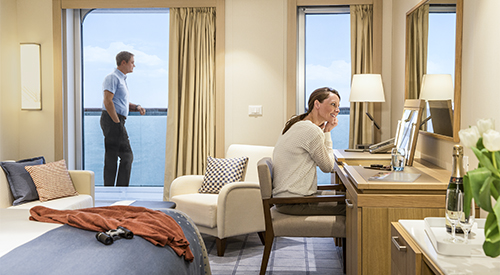
- 11:00 AM embarkation
- 2:00 PM stateroom access
- Priority shore excursion reservations: 67 days prior to departure
- 1 guaranteed priority reservation at each alternative restaurant: 60 days prior to departure
- Priority booking of spa treatments: 60 days prior to departure
- King-size Viking Explorer Bed with luxury linens & pillows
- Free Wi-Fi (connection speed may vary)
- 42" flat-screen, interactive LCD TV with intuitive remote & complimentary Movies On Demand
- 110/220 volt outlets & USB ports
- Mini-bar with soft drinks, water & snacks (replenished once daily); security safe; hair dryer
- Direct-dial satellite phone & cell service
- Large private bathroom with spacious glass-enclosed shower, heated bathroom floor & anti-fog mirror
- Premium Freyja® toiletries; plush robes & slippers
- Purified water refilled daily
- Stateroom steward & twice-daily housekeeping
- 24-hour room service
- Spacious closet & drawers
- In-suite binoculars, coffee brewer & traditional Norwegian Marius-weave blanket
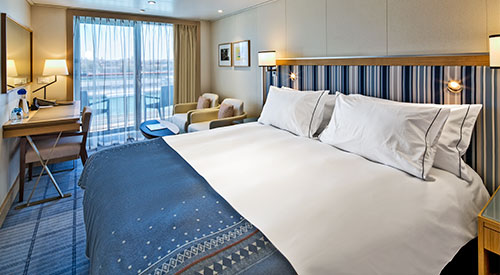
- 11:00 AM embarkation
- 3:00 PM stateroom access
- Shore excursion reservations: 60 days prior to departure
- King-size Viking Explorer Bed with luxury linens & pillows
- Free Wi-Fi (connection speed may vary)
- 42" flat-screen, interactive LCD TV with intuitive remote & complimentary Movies On Demand
- 110/220 volt outlets & USB ports
- Mini-bar with soft drinks, water & snacks; security safe; hair dryer
- Direct-dial satellite phone & cell service
- Large private bathroom with spacious glass-enclosed shower, heated bathroom floor & anti-fog mirror
- Premium Freyja® toiletries; plush robes & slippers
- Purified water refilled daily
- Stateroom steward & twice-daily housekeeping
- 24-hour room service
- Spacious closet & drawers

Viking Saturn
Expand your horizons on this comfortable, award-winning ship design, intimate and thoughtfully created by experienced nautical architects and designers to enrich your interaction with your destination in every way.
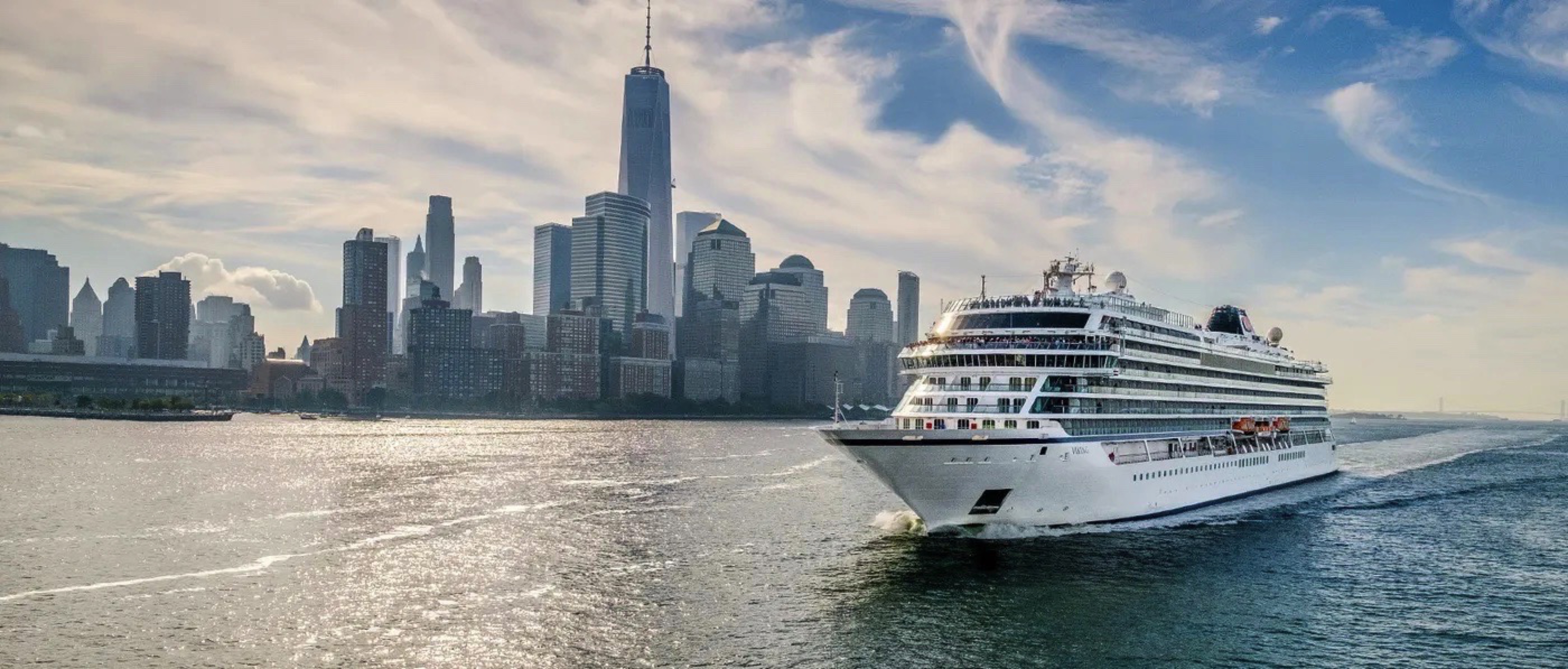
Ship Facts
| Launch Year | 2023 | ||||||||
| Refit Year | |||||||||
| Language | en | ||||||||
| Gross Tonnage | N/A | ||||||||
| Length | 2444 | ||||||||
| Width | 310 | ||||||||
| Currency | EUR | ||||||||
| Speed | N/A | ||||||||
| Capacity | 930 | ||||||||
| Crew Count | N/A | ||||||||
| Deck Count | N/A | ||||||||
| Cabin Count | N/A | ||||||||
| Large Cabin Count | N/A | ||||||||
| Wheelchair Cabin Count | N/A | ||||||||
| Electrical Plugs |
|
Deck 1
- The Kitchen Table
- The Chef's Table
- Manfredi's Italian Restaurant
- Private Dining 1
- Private Dining 2
- Lifts
- The Viking Living Room
- Viking Bar
- Shop
- Salon
- Fitness Center
- The Spa

Deck 2
- The Restaurant
- Atrium
- Torshavn
- The Shop
- Cinema 1
- Cinema 2
- Bar
- The Theatre

Deck 3
- Atrium
- Lifts
- Launderette
- Explorer Suites
- Verandas
- Deluxe Verandas

Deck 4
- Lifts
- Launderette
- Explorer Suites
- Deluxe Verandas
- Penthouse Verandas

Deck 5
- Lifts
- Launderette
- Explorer Suites
- Deluxe Verandas
- Penthouse Verandas

Deck 6
- Lifts
- Launderette
- Explorer Suites
- Penthouse Jr. Suites (Accessible)
- Penthouse Verandas
- Deluxe Verandas

Deck 7
- Infinity Pool
- Aquavit Terrace
- Hot Tub
- World Cafe
- Lifts
- Pool Grill
- Pool Bar
- Screen
- Main Pool
- Wintergarden
- Lanai
- Mamsen's
- Paps
- Explorers' Lounge
- Owner's Suites
- Penthouse Jr. Suite
- Deluxe Verandas

Deck 8
- Lifts
- Retractable Roof
- Explorers' Lounge Upper Level
- Penthouse Jr. Suites
- Deluxe Verandas

Deck 9
- Lifts
- Sports Deck
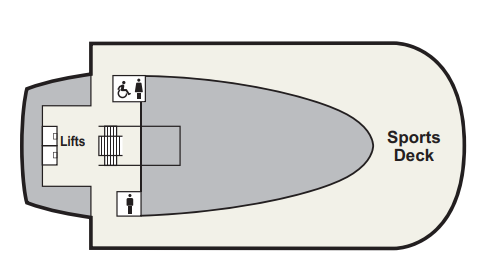
Deck a
- Lifts
- Medical Center

The Restaurant
Manfredi’s® Italian Restaurant
The Chef’s Table
World Café
Aquavit Terrace®
Mamsen’s®
Wintergarden
Pool Grill
Room Service
Elegant, light-filled ships thoughtfully designed to connect you to your destination.
The Library
The Living Room
Explorers' Lounge
Wintergarden
Under a canopy of Scandinavian trellised wood in the serene Wintergarden, indulge in afternoon tea service, complete with freshly made finger sandwiches, richly textured scones and delightful desserts.
Aquavit Terrace
Torshavn®
The Theatre & 2 Cinemas